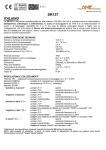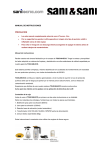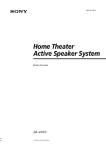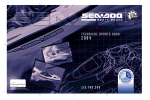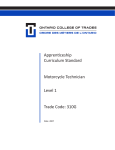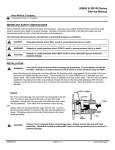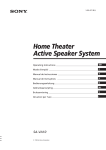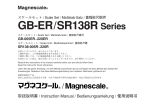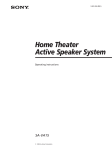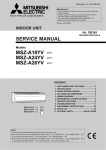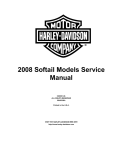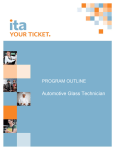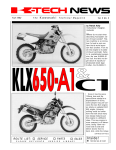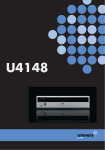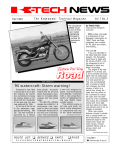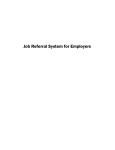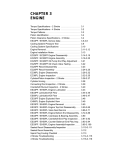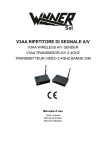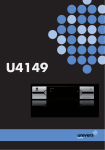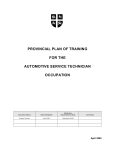Download Apprenticeship Training Standards Motorcycle Technician
Transcript
Apprenticeship Training Standard Motorcycle Technician Trade Code: 310G Development Date: October 2003 Please Note: Apprenticeship Training and Curriculum Standards were developed by the Ministry of Training, Colleges and Universities (MTCU). As of April 8th, 2013, the Ontario College of Trades (College) has become responsible for the development and maintenance of these standards. The College is carrying over existing standards without any changes. However, because the Apprenticeship Training and Curriculum Standards documents were developed under either the Trades Qualification and Apprenticeship Act (TQAA) or the Apprenticeship and Certification Act, 1998 (ACA), the definitions contained in these documents may no longer be accurate and may not be reflective of the Ontario College of Trades and Apprenticeship Act, 2009 (OCTAA) as the new trades legislation in the province. The College will update these definitions in the future. Meanwhile, please refer to the College’s website (http://www.collegeoftrades.ca) for the most accurate and up-to-date information about the College. For information on OCTAA and its regulations, please visit: http://www.collegeoftrades.ca/about/legislation-and-regulations Ontario College of Trades © MOTORCYCLE TECHNICIAN CONTENTS PAGE Apprenticeship Program Summary/Guidelines................................................................................3 Competency Analysis Profile...........................................................................................................6 Preface ............................................................................................................................................16 Definitions ......................................................................................................................................17 Important Directions for the Apprentice ........................................................................................19 Important Directions for the Sponsor/Employer and Supervisor/Trainer......................................19 Notice/Declaration for Collection of Personal Information ...........................................................20 Roles and Responsibilities of the Apprentice, Sponsor/Employer, and Supervisor/Trainer ........21 Skill Set Completion Form.............................................................................................................23 SKILL SETS U4130.0 Protect Self and Others...........................................................................................25 U4131.0 Apply General Work Practices and Procedures......................................................31 U4132.0 Perform Preliminary Diagnosis ..............................................................................35 U4133.0 Diagnose and Repair Two-Stroke and Four-Stroke Engine (Mechanical).............38 U4134.0 Diagnose and Repair Fuel Carburation System......................................................49 U4135.0 Diagnose and Repair Fuel-Injection System ..........................................................57 U4136.0 Diagnose and Repair Cooling System ....................................................................63 U4137.0 Diagnose and Repair Exhaust System ....................................................................67 U4138.0 Diagnose and Repair Driveline...............................................................................71 U4139.0 Diagnose and Repair Steering System....................................................................79 U4140.0 Diagnose and Repair Front Suspension..................................................................83 U4141.0 Diagnose and Repair Rear Suspension ...................................................................86 U4142.0 Diagnose and Repair Mechanical Braking System ................................................90 U4143.0 Diagnose and Repair Hydraulic Braking System ...................................................95 U4144.0 Diagnose and Repair Tires and Wheels..................................................................99 U4145.0 Diagnose and Repair Charging System ................................................................103 1 Ontario College of Trades © MOTORCYCLE TECHNICIAN U4146.0 Diagnose and Repair Electric Starting System.....................................................106 U4147.0 Diagnose and Repair Ignition System ..................................................................110 U4148.0 Diagnose and Repair Electrical Ancillaries..........................................................116 U4149.0 Diagnose and Repair Chassis and Chassis Components ......................................120 U4150.0 Service Body Parts................................................................................................122 U4151.0 Diagnose and Repair Sidecar................................................................................125 Apprentice Record........................................................................................................................128 Apprentice Completion Form.......................................................................................................131 2 Ontario College of Trades © MOTORCYCLE TECHNICIAN APPRENTICESHIP PROGRAM SUMMARY/GUIDELINES 1. Program Definition: Motorcycle Technician is defined as a person who: services, repairs, overhauls, and inspects motorcycles and tests them for faults and roadworthiness. MOTORCYCLE TECHNICIAN is an approved apprenticeship program for the purposes of the Apprenticeship and Certification Act, 1998 (ACA). 2. Program Guidelines On-the-Job Training Duration (for apprentices) The Industry Committee has identified 5520 hours as the duration generally necessary for any apprentice to become competent in the skills required. There may be individual circumstances in which the duration varies from this guideline. In-School Training Duration The Industry Committee has identified 480 hours of in-school training as the duration generally necessary for an apprentice to complete the in-school curriculum for this program, except where an apprentice has been exempted from any level of that curriculum. Ratio The Industry Committee has identified a journeyperson-to-apprentice ratio of one journeyperson or individuals who are deemed equivalent to a journeyperson status to one apprentice as the ratio generally necessary for an apprentice to be properly trained on the job in this program. There may be individual circumstances in which the ratio varies from this guideline. 3 Ontario College of Trades © MOTORCYCLE TECHNICIAN 3. Program Requirements Restricted Skill Sets This program contains one or more restricted skill sets as per Ontario Regulation 565/99, Restricted Skill Sets. An individual must either be a registered apprentice or possess a Certificate of Qualification or Letter of Permission in this program in order to perform skills contained within it. Academic Standard The Industry Committee has identified the minimum academic standard for entry to this program as completion of Grade 12 or ministry-approved equivalent. (See ACA Policy 102, Confirming Academic Requirements.) Eligibility for Exam Challenge (for Non-apprentice C of Q Applicants) The challenger must: provide proof of competency in all mandatory (unshaded) skills as identified in the Training Standard or Schedule of Training; demonstrate that he or she has acquired 6000 hours of on-the-job training. (See ACA Policy 150, Assessing Applicants for the Certificate of Qualification.) Eligibility for Program Completion (for Apprentices) The apprentice must: achieve competency in all mandatory (unshaded) skills as identified in the Training Standard or Schedule of Training; complete the in-school training as outlined in the industry and ministryapproved Curriculum Standard. (See ACA Policy 309, Completion of an Apprenticeship Program.) Other Resources Complete program requirements, policies, and standards can be obtained by referring to the following resources: Apprenticeship and Certification Act, 1998 (ACA) ACA General Regulation 573/99 ACA Exemption Regulation 566/99 Program-specific Apprenticeship Training Standards or Schedules of Training ACA Program and Policy Manual Other Required Certification N/A 4 Ontario College of Trades © MOTORCYCLE TECHNICIAN Academic Background Industry has identified relevant secondary-school course(s) likely to increase an individual’s chances of success if completed before program entry. For details, see the document Apprenticeship Subject Pathways. 5 Ontario College of Trades © MOTORCYCLE TECHNICIAN COMPETENCY ANALYSIS PROFILE Motorcycle Technician – 310G (All unshaded skill sets must be demonstrated/completed.) SKILLS SKILL SETS PROTECT SELF AND OTHERS U4130.0 Identify health and safety hazards in the workplace Wear, adjust, and maintain personal protective equipment Operate emergency safety equipment Practise good housekeeping in the workplace Operate and maintain tools and equipment in a safe manner U4130.01 Ensure protection from fire hazards U4130.02 Handle and store hazardous materials U4130.03 Report injuries to supervisor U4130.04 Complete written safety and injury reports U4130.05 Apply basic first aid U4130.06 Identify unsafe vehicles U4130.07 U4130.08 U4130.09 U4130.10 U4130.11 6 Ontario College of Trades © MOTORCYCLE TECHNICIAN APPLY GENERAL WORK PRACTICES AND PROCEDURES U4131.0 Perform preliminary diagnosis Access information in manufacturers’ service manuals and other related service materials Select, operate, and maintain hand, cutting, pneumatic, and electric power tools Operate and maintain shop equipment Operate and maintain dimensional measuring devices U4131.01 Select, operate, and maintain oxyacetylene arc, metal inert gas (MIG), and tungsten inert gas (TIG) welding equipment U4131.02 Replace fastening and sealing devices U4131.03 Select and replace or repair electrical wires and connectors U4131.04 Demonstrate troubleshooting techniques U4131.05 Perform customer relations activities U4131.06 Perform proper dismantling, logging, protection, and storage of parts U4131.07 Document measurements and defects noted during inspection U4131.08 U4131.09 U4131.10 U4131.11 PERFORM PRELIMINARY DIAGNOSIS U4132.0 Conduct visual examination of motorcycle U4132.01 U4131.12 Conduct a road test U4132.02 Isolate problem to a specific part of the motorcycle U4132.03 7 Ontario College of Trades © Prepare preliminary written estimates U4132.04 Prepare a written work order U4132.05 MOTORCYCLE TECHNICIAN DIAGNOSE AND REPAIR TWO-STROKE AND FOURSTROKE ENGINE (MECHANICAL) U4133.0 Conduct crankcase pressure test Perform a visual inspection of engine externals Listen to engine using an engine stethoscope Remove spark plugs Conduct compression and leak-down test U4133.01 Perform a visual inspection and functionally test oil-injection pump U4133.02 Remove and visually inspect cylinder heads U4133.03 Remove accumulated exhaust carbon from cylinder heads U4133.04 Resurface cylinder heads Remove cylinder block from crankcase U4133.06 Perform a visual inspection of cylinder components U4133.07 Clean and measure cylinder components U4133.09 Resleeve and resize cylinder U4133.10 Deglaze cylinder bore U4133.11 Chamfer cylinder ports U4133.12 Check and adjust piston ring end gap U4133.08 Perform a visual inspection and physically measure intake reed valves and exhaust power valves U4133.13 Remove engine from frame U4133.14 Disassemble engine U4133.15 Disassemble, visually inspect, clean, and measure crankshaft components U4133.16 Perform a visual inspection of intake rotary valves U4133.17 Perform a visual inspection of crankcases, support bearings, and bushings U4133.18 Replace crankshaft components U4133.19 Perform a visual inspection of counterbalancer components U4133.20 Install counterbalancer and crankshaft in engine crankcases U4133.21 Reinstall intake rotary valve in crankcase U4133.22 Reinstall internal cylinder components U4133.23 Reinstall engine in motorcycle frame U4133.24 Bleed air from and adjust oilinjector pump U4133.25 Replace fluids U4133.26 Perform final adjustments U4133.27 U4133.28 U4133.29 U4133.30 U4133.31 8 Ontario College of Trades © U4133.05 MOTORCYCLE TECHNICIAN DIAGNOSE AND REPAIR FUEL CARBURATION SYSTEM U4134.0 Perform a visual inspection for sufficient fuel quantity and quality U4134.01 Inspect and repair or replace fuel lines and filters U4134.06 Remove, replace, and adjust carburettor cables and control linkages U4134.11 Perform functional tests, and replace and adjust float, needle, needle seat, and float bowl vent U4134.16 Install carburettor on intake manifolds U4134.21 Perform test to ensure fuel is of correct type Perform a visual and physical inspection of fuel venting systems Perform a visual inspection of air filters and air box Test operation of petcock U4134.02 Perform functional tests of fuel pump operation U4134.03 Test and repair fuel pump electrical circuit components U4134.04 Replace fuel pump U4134.05 Perform a visual inspection and functionally test carburettor control linkage and cables U4134.07 Perform a visual inspection and functionally check mounting and condition of intake manifolds and fittings U4134.12 Clean and perform a visual inspection of pilot, intermediate, and main jets, and fuel and air passages in carburettor body U4134.17 Adjust carburettor U4134.08 Remove carburettor from manifold U4134.09 Disassemble carburettor U4134.10 Perform a visual inspection of and clean float bowl U4134.13 Clean and perform a visual inspection of accelerator pump components U4134.14 Clean, perform a visual inspection of, and replace carburettor venturi system components U4134.18 U4134.19 U4134.22 9 Ontario College of Trades © U4134.15 Reassemble carburettor components U4134.20 MOTORCYCLE TECHNICIAN DIAGNOSE AND REPAIR FUELINJECTION SYSTEM U4135.0 Perform a visual inspection for sufficient fuel quantity and quality Perform a test to ensure fuel is of correct type Perform a visual inspection of air filters and air box Perform a physical inspection of fuel tank components Perform a physical inspection of fuel lines, in-line filters, hoses, and fittings U4135.01 Test fuel pump operation and fuel pressure regulation system U4135.02 Replace fuel pump pressure regulation valve, hoses, fittings, fuel pump lines, and electrical components U4135.03 Test fuel pump electrical circuits U4135.04 Inspect and replace cables and linkages U4135.05 Inspect and functionally test intake manifold, fittings, and vacuum hoses U4135.06 Perform functional test of injector U4135.07 Remove and perform a physical inspection of injector body U4135.08 Replace injectors U4135.09 Compare fuelinjector computer codes with service manual U4135.10 Perform inspection of fuel-injector control system components U4135.13 U4135.14 U4135.15 U4135.11 Repair and replace injector control system components U4135.12 U4135.16 DIAGNOSE AND REPAIR COOLING SYSTEM U4136.0 DIAGNOSE AND REPAIR EXHAUST SYSTEM U4137.0 For air-cooled engine perform a visual inspection for damaged fins and proper air flow and remove restriction U4136.01 Replace cooling system components For liquid-cooled engine perform a visual inspection of cooling system components Perform functional test of coolant strength and quantity in radiator U4136.02 Check, replace, and rebuild water pumps and drives U4136.03 Flush, bleed, and refill cooling system U4136.06 U4136.07 U4136.08 Perform a visual inspection of exhaust system U4137.01 Perform an audible inspection of exhaust system U4137.02 Disassemble and decarbonize exhaust system components U4137.03 10 Ontario College of Trades © Perform pressure test of cooling system components U4136.04 Disassemble, inspect, and repair exhaust power valve components U4137.04 Test cooling system controls U4136.05 Repair or replace exhaust system components U4137.05 MOTORCYCLE TECHNICIAN DIAGNOSE AND REPAIR DRIVELINE U4138.0 Inspect clutch activating mechanism Adjust clutch cable/linkage freeplay Expose and inspect primary drive components Reassemble primary drive components Disassemble, clean, and visually inspect clutch components U4138.02 Reassemble and install clutch assembly, replacing defective components U4138.03 Perform operational tests of kick-starter U4138.04 Replace, lubricate, and reassemble kickstarter components U4138.05 Inspect external shifter mechanism U4138.06 Replace, lubricate, and adjust external shifter mechanism U4138.07 Perform a visual inspection of outer transmission case U4138.08 Expose, disassemble, and inspect transmission internal parts U4138.09 Clean and measure transmission components U4138.10 Perform a visual inspection of inner transmission case U4138.11 Lubricate, replace, and reassemble transmission components U4138.12 Expose and perform a visual inspection of final chain/belt drive U4138.13 Disassemble, replace, and adjust chains, sprockets, belts, and pulleys U4138.14 Inspect and replace front bevel gears U4138.15 Inspect and replace driveshaft assembly components U4138.16 Disassemble, clean, and inspect final drive housing components U4138.17 Lubricate, replace, reassemble, and adjust final drive components U4138.18 U4138.19 U4138.20 Disassemble and inspect steering head components Repair or replace and assemble steering head components U4139.04 U4139.05 Perform a visual and physical inspection U4138.01 U4138.21 DIAGNOSE AND REPAIR STEERING SYSTEM U4139.0 Inspect front-end and frame components visually and physically U4139.01 U4138.22 Functionally test steering stops and steering lock U4139.02 Adjust steering head bearing and front wheel bearings U4139.03 Inspect or replace hydraulic steering friction dampeners U4139.06 11 Ontario College of Trades © MOTORCYCLE TECHNICIAN DIAGNOSE AND REPAIR FRONT SUSPENSION U4140.0 Perform a visual inspection U4140.01 Identify and service front suspension system U4140.06 DIAGNOSE AND REPAIR REAR SUSPENSION U4141.0 DIAGNOSE AND REPAIR MECHANICAL BRAKING SYSTEM U4142.0 Inspect rear suspension components U4141.01 Inspect, test, adjust, and replace auto levelling system components Perform operational test of front suspension system hydraulic and pneumatic anti-dive mechanisms U4140.02 Perform suspension sag measurements Disassemble, inspect, and measure front fork assembly components U4140.03 Replace or reassemble fork assembly components U4140.04 Inspect and functionally test and repair air compressor system and components U4140.05 U4140.07 Disassemble, clean, and inspect rear suspension components Inspect and replace or rebuild shocks U4141.02 U4141.03 Replace rear suspension components and reassemble U4141.04 Perform suspension sag measurements U4141.05 Align back wheel to front wheel U4141.06 U4141.07 Perform a visual and an operational inspection of brake levers, cables, and linkages Lubricate, adjust, and replace, linkages, cables, and levers U4142.01 U4142.02 Rebuild and replace mechanical calipers Replace friction material on brake shoes in calipers U4142.06 U4142.07 Remove wheels U4142.03 Resurface brake drums and discs U4142.08 12 Ontario College of Trades © Remove, clean, and perform visual inspections of internal and external brake components U4142.04 Replace and adjust drums, rotors, and friction materials on wheels U4142.09 Measure brake system components U4142.05 Reassemble, lubricate, and adjust mechanical braking systems U4142.10 MOTORCYCLE TECHNICIAN DIAGNOSE AND REPAIR HYDRAULIC BRAKING SYSTEM U4143.0 Perform a visual and physical inspection Remove, rebuild, or replace master cylinders, wheel cylinders, and calipers Remove and replace brake fluid proportioning valve Identify the requirement of care and attention to the usage or spillage of brake fluid Remove and replace brake lines, banjo bolts, and crush washers U4143.01 Measure and inspect brake drums and discs U4143.02 Measure and replace disc brake pads and friction material on brake shoes U4143.03 Inspect and test anti-lock braking system U4143.04 Replace and adjust anti-lock braking system components U4143.05 Flush, replenish, and bleed fluids U4143.06 Adjust lever freeplay at master cylinder U4143.07 U4143.08 U4143.09 U4143.10 U4143.11 DIAGNOSE AND REPAIR TIRES AND WHEELS Perform a visual and physical inspection of tires Inspect and test wheels Remove, clean, and inspect internal wheel and hub components Lubricate and reassemble hub components U4144.0 U4144.01 Remove, replace, and adjust tension of spokes U4144.02 Install tire on rim U4144.03 Balance wheel assembly U4144.04 Replace tire/wheel assembly U4144.06 U4144.07 U4144.08 U4144.09 DIAGNOSE AND REPAIR CHARGING SYSTEM U4145.0 Perform a visual inspection of wiring connectors and fuses U4145.01 Test regulator/rectifier Charge or replace battery Inspect, clean, identify, and test battery U4145.02 U4145.03 U4145.06 13 Ontario College of Trades © Test alternating current generator U4145.04 Clean and inspect tire and rim components U4144.05 Repair wiring and connections U4145.05 MOTORCYCLE TECHNICIAN DIAGNOSE AND REPAIR ELECTRIC STARTING SYSTEM U4146.0 DIAGNOSE AND REPAIR IGNITION SYSTEM U4147.0 DIAGNOSE AND REPAIR ELECTRICAL ANCILLARIES U4148.0 Inspect and clean battery, power, and ground wiring and connectors Identify battery, type 1 charges, and load test, and replace battery Perform functional tests of starting system components Repair or replace switches, solenoids, and starter relays U4146.01 Repair or replace starter motor components U4146.02 Replace mechanical starter drive components U4146.03 Assemble and lubricate starter system components U4146.04 U4146.06 U4146.07 U4146.08 Disassemble, clean, and measure starter components U4146.05 Inspect and clean battery, power, and ground wiring and connectors Charge, load test, and replace battery Identify and test power source to ignition Test for spark at plug(s) Test and replace high-tension leads and spark plug cap U4147.01 Test and replace ignition coils U4147.02 Test and repair wiring and connectors U4147.03 Inspect and replace points and condenser U4147.04 Inspect, lubricate, or replace ignition advance system and components U4147.05 Adjust timing of breaker-point ignition system U4147.06 Adjust air gap on pick-up coil on electronic ignition U4147.07 Test and replace pick-up coil on electronic ignition U4147.08 Test and replace ignition module and related wiring U4147.09 Adjust and clean timing of electronic ignition system U4147.10 U4147.11 Inspect and clean battery, power, and ground wiring and connectors U4147.12 Charge, load test, and replace batteries U4147.13 Perform visual and functional tests of fuses, circuit breakers, and fusible links U4147.14 Isolate and repair opens, shorts, and grounds in wiring and connectors U4148.01 Repair or replace accessory operating switches U4148.02 Test and replace defective ancillaries U4148.03 U4148.04 U4148.06 U4148.07 14 Ontario College of Trades © Test ancillary operating switches U4148.05 MOTORCYCLE TECHNICIAN DIAGNOSE AND REPAIR CHASSIS AND CHASSIS COMPONENTS U4149.0 SERVICE BODY PARTS U4150.0 Perform a visual inspection of chassis components U4149.01 Perform a visual inspection of body parts U4150.01 Replace body parts Perform functional test of frame and suspension alignment U4149.02 Disassemble and correctly store body parts U4150.02 Replace chassis and chassis components U4149.03 Perform a visual inspection and identify body part hardware Repair or replace body part hardware U4150.03 U4150.04 Align sidecars to motorcycle frame Repair or replace sidecar components U4151.03 U4151.04 Repair or replace body parts U4150.05 U4150.06 DIAGNOSE AND REPAIR SIDECAR U4151.0 Measure and perform a visual inspection of sidecar unit, frame, mountings, and alignment U4151.01 Perform functional tests and repairs to sidecar braking systems U4151.02 15 Ontario College of Trades © Reassemble, lubricate, and adjust sidecar components U4151.05 MOTORCYCLE TECHNICIAN PREFACE This training standard was developed by the Workplace Training Branch of the Ministry of Training, Colleges, and Universities (MTCU), in partnership with the Industry Committees and in consultation with representatives from the industry. This document is intended to be used by the apprentice, supervisor/trainer, and sponsor/employer as a “blueprint” for training and as a prerequisite for completion and certification. This training document becomes the apprentice’s only record of workplace training performance. The supervisor/trainer and apprentice are required to sign off on and date the skills following each successful acquisition, unless a skill is marked shaded (optional). The care and maintenance of this training document are the joint responsibility of the apprentice and the sponsor/employer. By signing off on the skill, the supervisor/trainer and the apprentice are indicating that the apprentice has demonstrated competence in the skill. This training standard has been developed specifically for documenting the apprentice’s acquisition of skills of the trade. 16 Ontario College of Trades © MOTORCYCLE TECHNICIAN DEFINITIONS ACA Apprenticeship and Certification Act, 1998 Certificate of Apprenticeship (C of A) Certification issued to individuals who have demonstrated that they have completed an apprenticeship in Ontario Certificate of Qualification (C of Q) Certification issued to C of Q applicants who have achieved a passing grade on the certification exam for their trade Competency Analysis Profile A document that identifies the training needs of an individual trade and details the skills/skill sets that must be demonstrated Competence The ability of an individual to perform a skill repeatedly and without assistance in the workplace to the standard set out in the Training Standard or Schedule of Training General Performance Objective (On-the-Job Skill Set) Describes a set of skills that includes all performance objectives under that skill set Industry Committee (IC) – Under the ACA and Provincial Advisory Committee (PAC) Under the TQAA Under the ACA and TQAA, the Minister may appoint a provincial committee in any trade or group of trades to advise the Minister in matters relating to the establishment and operation of apprenticeship training programs and trades qualifications. Journeyperson or Equivalent A person who has acquired the knowledge and skills in a trade, occupation, or craft as attested to by a provincial or territorial authority Mandatory Status assigned to unshaded individual skills, skill sets, or general performance objectives that must be signed off on for the apprentice to complete the program Optional Status assigned to shaded individual skills, skills sets, or general performance objectives for which sign-off is not required for the apprentice to complete the program but that may be tested on an examination for certification Sign-Off 17 Ontario College of Trades © MOTORCYCLE TECHNICIAN Signature of the sponsor/employer of record or an individual to whom that sponsor or employer has delegated signing authority, indicating an apprentice’s achievement of competence Skill Individual skill described in the Training Standard (note: does not mean the larger skill groups referred to in the Training Standard as Skill Sets, Training Units, or General Performance Objective, but the individual skills that make up those groups) Skill Sets Group of individual skills found in the Training Standard (may also be called Training Unit or General Performance Objective) Skill Set Completion Form Lists all skill sets and includes space for sign-off by sponsor/employer of record Sponsor/Employer A person who has entered into a registered training agreement under which the person is required to ensure that an individual is provided with workplace-based training in a trade, other occupation, or skill set as part of an apprenticeship program approved by the Director Sponsor/Employer of Record Refers to the sponsor or employer documented as the signatory to the current training agreement or contract. For sponsors/employers to be considered for the training of apprentices, they must identify that the workplace has qualified journeypersons or equivalent on site and can identify that the workplace has the tools, equipment, materials, and processes that have been identified by Provincial Advisory Committees (PACs) or Industry Committees (ICs) as being required for the trade. Supervisor An individual who oversees the execution of a task or oversees the actions or work of others Trainer A qualified trainer in a compulsory trade is a journeyperson with a Certificate of Qualification or in a voluntary trade is an individual who is considered equivalent to a journeyperson with a Certificate of Qualification. TQAA Trades Qualification and Apprenticeship Act Training Standard A document that has been written in concise statements that describe how well an apprentice must perform each skill in order to become competent. By using the document, trainers will be able to ensure that the apprentice is developing skills detailed for the occupation. 18 Ontario College of Trades © MOTORCYCLE TECHNICIAN IMPORTANT DIRECTIONS For the Apprentice 1. All complete skills or skill sets must be signed and dated by both the apprentice and the sponsor/employer when either all terms of the contract have been completed or the apprentice leaves the employ of the employer. 2. It is the responsibility of the apprentice to inform the local Apprenticeship Client Services Office regarding the following changes: $ $ $ change of sponsor/employer address change of apprentice name or address transfer to a new sponsor/employer 3. The Skill Set Completion Form must be completed and signed by the current sponsor/employer and presented to the local Apprenticeship Client Services Office at the fulfilment of all terms of a Contract of Apprenticeship/Training Agreement. 4. The Apprentice Completion Form with the Completed and Authorized Training Standard must be presented to the local Apprenticeship Client Services Unit. For the Sponsor/Employer and Supervisor/Trainer The Training Standard identifies skills required for this trade/occupation and its related training program. This Training Standard has been written in concise statements that describe how an apprentice must perform each skill in order to become competent. Competence means being able to perform the task to the required standard. By using this Training Standard, supervisors/trainers will be able to ensure that the apprentice is developing the skills detailed for the trade/occupation. Supervisors/trainers and apprentices are required to sign off on and date the skills following each successful acquisition. Sponsors/employers participating in this training program will be designated as the Signing Authority and are required to attest to successful achievement by signing the appropriate box included at the end of each skill set. 19 Ontario College of Trades © NOTICE OF COLLECTION OF PERSONAL INFORMATION 1. At any time during your apprenticeship training, you may be required to show this training standard to the Ministry of Training, Colleges and Universities (the Ministry). You will be required to disclose the signed Apprenticeship Completion form to the Ministry in order to complete your program. The Ministry will use your personal information to administer and finance Ontario’s apprenticeship training system, including confirming your completion and issuing your certificate of apprenticeship. 2. The Ministry will disclose information about your program completion and your certificate of apprenticeship to the Ontario College of Trades, as it is necessary for the College to carry out its responsibilities. 3. Your personal information is collected, used and disclosed by the Ministry under the authority of the Ontario College of Trades and Apprenticeship Act, 2009. 4. Questions about the collection, use and disclosure of your personal information by the Ministry may be addressed to the: Manager, Employment Ontario Contact Centre Ministry of Training, Colleges and Universities 33 Bloor St. E, 2nd floor, Toronto, Ontario M7A 2S3 Toll-free: 1-800-387-5656; Toronto: 416-326-5656 TTY: 1-866-533-6339 or 416-325-4084. 20 MOTORCYCLE TECHNICIAN ROLES AND RESPONSIBILITIES OF THE APPRENTICE, SPONSOR/EMPLOYER, AND SUPERVISOR/TRAINER Apprentice “Apprenticeship is a learning exercise.” $ $ $ $ $ $ $ $ Practise safe work habits. Use your apprenticeship training standard as a journal to keep track of which skills you have achieved. Talk over your training plan with your Training Consultant, Employer, Union, or Sponsor. Know what tools are required for your trade and how to use them. Ask questions and keep asking. Talk to your employer about your training needs. Demonstrate enthusiasm and good work habits. Ensure that you and your supervisor/trainer sign off on skill/skill sets on demonstration of competency. Sponsor/Employer “Training is an investment.” $ $ $ $ $ $ $ $ $ $ $ $ $ Demonstrate safe work habits. Attest to successful achievement by signing off on the skill/skills sets. Provide opportunities and time for the apprentice to learn the trade. Offer practical trade training experiences that cover all the skill sets. Foster work ethics that support training while minimizing productivity losses. Set out clear expectations, then recognize or reward performance excellence. Involve both the apprentice and the supervisor/trainer in developing the training plan. Use the Training Standard as a monitoring tool and part of regular performance evaluations. Select supervisors/trainers who have good communication skills and who work well with others. Encourage supervisors/trainers to take upgrading courses (Train the Trainer, Mentor Coach, etc.). Complete the Skill Set Completion Form once the apprentice has demonstrated competency in the training. Ensure that the apprentice always works under the direction of or has access to a qualified supervisor/trainer. Vary the apprentice’s exposure to all the skills set out in the Training Standard. 21 Ontario College of Trades © MOTORCYCLE TECHNICIAN Supervisor/Trainer $ $ $ $ $ $ $ $ Demonstrate safe work habits. Treat apprentices fairly and with respect. Use the Training Standard as a guide to evaluating competence in each skill area. By using the Training Standard, supervisors/trainers will be able to ensure that the apprentice is developing skills detailed for the trade/occupation. Review the Training Standard with the apprentice and develop a training plan. Respond fully to all questions. Be patient. Explain what is to be done, then show how it is done, and then let the apprentice demonstrate the task. Provide continual feedback. Sign off on individual skills/skill sets once the apprentice demonstrates competence in the skill. Suggestions for Assessing the Progress of the Apprentice in the Workplace $ $ $ $ $ $ Use informal daily observation. Provide constructive feedback to build confidence. Allow the supervisor/trainer time to teach and demonstrate the skills. Take prompt action whenever problems occur. Conduct regular performance reviews involving the apprentice, supervisor/trainer, and sponsor/employer. Use the Training Standard as the reference for establishing the competency of the apprentice. 22 Ontario College of Trades © MOTORCYCLE TECHNICIAN SKILL SET COMPLETION FORM SKILLS SETS U4130.0 SIGNING AUTHORITY TITLE U4131.0 PROTECT SELF AND OTHERS APPLY GENERAL WORK PRACTICES AND PROCEDURES U4132.0 PERFORM PRELIMINARY DIAGNOSIS U4133.0 U4134.0 U4135.0 U4136.0 U4137.0 U4138.0 U4139.0 U4140.0 U4141.0 U4142.0 U4143.0 U4144.0 U4145.0 U4146.0 U4147.0 DIAGNOSE AND REPAIR TWO-STROKE AND FOUR-STROKE ENGINE (MECHANICAL) DIAGNOSE AND REPAIR FUEL CARBURATION SYSTEM DIAGNOSE AND REPAIR FUEL-INJECTION SYSTEM DIAGNOSE AND REPAIR COOLING SYSTEM DIAGNOSE AND REPAIR EXHAUST SYSTEM DIAGNOSE AND REPAIR DRIVELINE DIAGNOSE AND REPAIR STEERING SYSTEM DIAGNOSE AND REPAIR FRONT SUSPENSION DIAGNOSE AND REPAIR REAR SUSPENSION DIAGNOSE AND REPAIR MECHANICAL BRAKING SYSTEM DIAGNOSE AND REPAIR HYDRAULIC BRAKING SYSTEM DIAGNOSE AND REPAIR TIRES AND WHEELS DIAGNOSE AND REPAIR CHARGING SYSTEM DIAGNOSE AND REPAIR ELECTRIC STARTING SYSTEM DIAGNOSE AND REPAIR IGNITION SYSTEM 23 Ontario College of Trades © MOTORCYCLE TECHNICIAN U4149.0 DIAGNOSE AND REPAIR ELECTRICAL ANCILLARIES DIAGNOSE AND REPAIR CHASSIS AND CHASSIS COMPONENTS U4150.0 SERVICE BODY PARTS U4151.0 DIAGNOSE AND REPAIR SIDECAR U4148.0 NOTE ON SHADED PERFORMANCE OBJECTIVES AND SKILLS $ $ $ Shaded performance objectives and skill sets are optional. The shaded skills do not have to be demonstrated or signed off on for completion of the on-the-job component of the apprenticeship. The in-school curriculum learning outcomes will cover all the skill sets, both shaded and unshaded. The Certificate of Qualification examination will test the whole of the trade and may test both shaded and unshaded performance skill sets. 24 Ontario College of Trades © MOTORCYCLE TECHNICIAN U4130.0 PROTECT SELF AND OTHERS GENERAL PERFORMANCE OBJECTIVES Protect self and others in the workplace by interpreting government and company safety standards and regulations, identifying health and safety hazards, and maintaining good housekeeping and working practices so that the workplace remains injury free, government and company safety and environmental standards are met, and all tools and equipment are maintained in safe operating condition. PERFORMANCE OBJECTIVES SKILLS U4130.01 Identify health and safety hazards in the workplace, so that the potential for personal injury and damage to equipment, vehicles, and the environment are minimized, corrective action as defined in government legislation or company policies is taken, and hazards are reported. Signatures of: U4130.02 _________________________ Apprentice ___________ Date _________________________ Supervisor/Trainer ___________ Date Wear, adjust, and maintain personal protective equipment, such as eye, ear, hand, and foot protectors, so that safety clothing is correctly fitted and provides optimum protection to the wearer for the task being performed, including helmets, gloves, riding boots, and equipment necessary for the safe operation of a motorcycle. Signatures of: _________________________ Apprentice ___________ Date _________________________ Supervisor/Trainer ___________ Date 25 Ontario College of Trades © MOTORCYCLE TECHNICIAN U4130.0 PROTECT SELF AND OTHERS (cont.) U4130.03 Operate emergency safety equipment such as fire extinguishers, respirators, stretchers, and fire blankets to extinguish fires and administer first aid, so that procedures are carried out in safe, efficient manner in accordance with health and safety regulations. Signatures of: U4130.04 _________________________ Apprentice ___________ Date _________________________ Supervisor/Trainer ___________ Date Practise good housekeeping in the workplace by cleaning up oil spills, keeping work area clean and clear of obstructions, and storing tools so that the potential for accident or injury is minimized and tools and equipment are in place and available for the next job. Signatures of: U4130.05 _________________________ Apprentice ___________ Date _________________________ Supervisor/Trainer ___________ Date Operate and maintain tools and equipment in a safe manner so that vehicle damage and personal injury are prevented, and tools and equipment are kept clean and in good working order. Signatures of: _________________________ Apprentice ___________ Date _________________________ Supervisor/Trainer ___________ Date 26 Ontario College of Trades © MOTORCYCLE TECHNICIAN U4130.0 PROTECT SELF AND OTHERS (cont.) U4130.06 Ensure protection from fire hazards by keeping work area clear, identifying and removing potential fire hazards, and carefully handling explosive and flammable materials, so that hazardous situations and unsafe work practices are eliminated. Signatures of: U4130.07 _________________________ Apprentice ___________ Date _________________________ Supervisor/Trainer ___________ Date Handle and store hazardous materials, such as battery acid, brake dust, chemicals, and exhaust gases, using specified handling and storage equipment so that the technician is protected from injury and the environment from contamination, and so that procedures followed are in compliance with provincial and federal legislation. Signatures of: U4130.08 _________________________ Apprentice ___________ Date _________________________ Supervisor/Trainer ___________ Date Report injuries to supervisor or service manager promptly and efficiently, ensuring that the injured person is attended to, information is recorded precisely as to how incident occurred, and future recurrence of similar accidents is prevented. Signatures of: _________________________ Apprentice ___________ Date _________________________ Supervisor/Trainer ___________ Date 27 Ontario College of Trades © MOTORCYCLE TECHNICIAN U4130.0 PROTECT SELF AND OTHERS (cont.) U4130.09 Complete written safety and injury reports, following applicable safety acts and regulations, so that information for the Workplace Safety and Insurance Board and legal and insurance forms is complete and accurate and required deadlines are adhered to. Signatures of: U4130.10 _________________________ Apprentice ___________ Date _________________________ Supervisor/Trainer ___________ Date Apply basic first aid to treat conditions such as sudden illnesses, burns, cuts, abrasions, sprains, chemical inhalations, and contaminants in eyes, so that the condition of the victim is stabilized and he or she is prepared for transport to more advanced medical care facilities. Signatures of: _________________________ Apprentice ___________ Date _________________________ Supervisor/Trainer ___________ Date 28 Ontario College of Trades © MOTORCYCLE TECHNICIAN U4130.0 PROTECT SELF AND OTHERS (cont.) U4130.11 Identify unsafe vehicles by checking for damaged or defective components in the braking, steering, exhaust, fuel, and suspension systems, so that faults can be corrected and the vehicle can be restored to a safe operating condition. Signatures of: _________________________ Apprentice ___________ Date _________________________ Supervisor/Trainer ___________ Date _____________________________ Sponsor/Employer Signature _______________________________ Sponsor/Employer Name 29 Ontario College of Trades © MOTORCYCLE TECHNICIAN U4131.0 APPLY GENERAL WORK PRACTICES AND PROCEDURES GENERAL PERFORMANCE OBJECTIVES Apply general work practices and procedures in the repair of motorcycles, including the development of effective customer relations, the selection and application of troubleshooting techniques, the access of technical information, the application and care of tools, equipment, and fastening and sealing devices, and the application of electrical wiring techniques, so that customers’ needs and expectations are met, an efficient and systematic diagnosis and repair procedure is followed, and repairs meet manufacturers’ specifications. PERFORMANCE OBJECTIVES SKILLS U4131.01 Perform preliminary diagnosis, so that customers’ complaints are verified and documented using effective communication skills and correct use of industry terminology and ethical business practices, and a repair order is prepared that provides a precise agreement on repair procedures to be performed. Signatures of: _________________________ Apprentice ___________ Date _________________________ Supervisor/Trainer ___________ Date 30 Ontario College of Trades © MOTORCYCLE TECHNICIAN U4131.0 APPLY GENERAL WORK PRACTICES AND PROCEDURES (cont.) U4131.02 Access information in manufacturers’ service manuals and other related service materials, such as parts bulletins, service supplements, parts catalogues, and technical updates, so that service information and procedures are correctly followed. Signatures of: U4131.03 _________________________ Apprentice ___________ Date _________________________ Supervisor/Trainer ___________ Date Select, operate, and maintain hand, cutting, pneumatic, and electric power tools, so that the tool selected is the correct one for the application and manufacturers’ recommended operating and servicing procedures are followed. Signatures of: U4131.04 _________________________ Apprentice ___________ Date _________________________ Supervisor/Trainer ___________ Date Operate and maintain shop equipment such as cleaning equipment, hydraulic press, lifting and jacking equipment, hydraulic pullers, and air compressors, so that manufacturers’ recommended operating and servicing procedures are adhered to and the equipment is correct for the job being performed. Signatures of: _________________________ Apprentice ___________ Date _________________________ Supervisor/Trainer ___________ Date 31 Ontario College of Trades © MOTORCYCLE TECHNICIAN U4131.0 APPLY GENERAL WORK PRACTICES AND PROCEDURES (cont.) U4131.05 Operate and maintain dimensional measuring devices such as micrometers, calipers, gauges, straight edges, and dial indicators, so that an accurate measurement is obtained and devices are clean, calibrated, and stored to prevent damage. Signatures of: U4131.06 _________________________ Apprentice ___________ Date _________________________ Supervisor/Trainer ___________ Date Select, operate, and maintain oxyacetylene, arc, metal inert gas (MIG), and tungsten inert gas (TIG) welding equipment, so that metal surfaces are prepared for welding, personal protection equipment is worn or positioned, and voltage, amperage, gas pressures, and feeds are adjusted in accordance with manufacturers’ specifications and welding operations are performed in accordance with government and company safety regulations. Signatures of: U4131.07 _________________________ Apprentice ___________ Date _________________________ Supervisor/Trainer ___________ Date Replace fastening and sealing devices such as screws, bolts, rivets, nuts, washers, snap rings, lock-tite components, pins, seals, gaskets, and sealants, so that joined surfaces are fitted, secured, leak resistant, and meet manufacturers’ specifications. Signatures of: _________________________ Apprentice ___________ Date _________________________ Supervisor/Trainer ___________ Date 32 Ontario College of Trades © MOTORCYCLE TECHNICIAN U4131.0 APPLY GENERAL WORK PRACTICES AND PROCEDURES (cont.) U4131.08 Select and replace or repair electrical wires and connectors so that electrical/electronic integrity is maintained, electromagnetic interference is isolated, and all shorts and grounds are repaired. Signatures of: U4131.09 _________________________ Apprentice ___________ Date _________________________ Supervisor/Trainer ___________ Date Demonstrate troubleshooting techniques using electronic test equipment, onboard diagnostics, and service literature, so that faults are isolated systematically and repairs are performed according to manufacturers’ specifications. Signatures of: U4131.10 _________________________ Apprentice ___________ Date _________________________ Supervisor/Trainer ___________ Date Perform customer relations activities, including providing an honest interpretation of the vehicle’s condition, explaining repairs and costs, providing a written statement of work performed, and resolving customers’ complaints so that customers’ expectations are met and information is communicated in a courteous and friendly manner. Signatures of: _________________________ Apprentice ___________ Date _________________________ Supervisor/Trainer ___________ Date 33 Ontario College of Trades © MOTORCYCLE TECHNICIAN U4131.0 APPLY GENERAL WORK PRACTICES AND PROCEDURES (cont.) U4131.11 Perform proper dismantling, logging, protection, and storage of parts in the proper order so that assembling is correct and coordinated as per manufacturers’ specifications. Signatures of: U4131.12 _________________________ Apprentice ___________ Date _________________________ Supervisor/Trainer ___________ Date Document measurements and defects noted during inspection, using computer and writing skills to convey the condition of the motorcycle to the client and the service team. Signatures of: _________________________ Apprentice ___________ Date _________________________ Supervisor/Trainer ___________ Date _____________________________ Sponsor/Employer Signature _______________________________ Sponsor/Employer Name 34 Ontario College of Trades © MOTORCYCLE TECHNICIAN U4132.0 PERFORM PRELIMINARY DIAGNOSIS GENERAL PERFORMANCE OBJECTIVES Perform preliminary diagnosis of motorcycle so that customers’ complaints are verified and documented, a visual inspection and road test is conducted, and a repair order and estimate are prepared that provide a precise agreement on repair procedures to be performed. PERFORMANCE OBJECTIVES SKILLS U4132.01 Conduct visual examination of motorcycle so that the general condition of the motorcycle and its related safety systems such as brakes, steering, and suspension can be assessed and requirement for road test can be determined. Signatures of: U4132.02 _________________________ Apprentice ___________ Date _________________________ Supervisor/Trainer ___________ Date Conduct a road test of the motorcycle so that the customer’s complaint can be verified and an accurate assessment of the damage can be made in order for a written repair estimate to be presented to the customer for approval. Signatures of: _________________________ Apprentice ___________ Date _________________________ Supervisor/Trainer ___________ Date 35 Ontario College of Trades © MOTORCYCLE TECHNICIAN U4132.0 PERFORM PRELIMINARY DIAGNOSIS (cont.) U4132.03 Isolate problem to a specific part of the motorcycle using manufacturers’ recommended diagnosis procedures so that repairs can be made in an efficient and cost-effective manner. Signatures of: U4132.04 _________________________ Apprentice ___________ Date _________________________ Supervisor/Trainer ___________ Date Prepare preliminary written estimates that provides precise contracts on repairs to be made and obtains customers’ authorization to proceed with additional diagnosis, inspection, and repairs as per the provincial repair act. Signatures of: _________________________ Apprentice ___________ Date _________________________ Supervisor/Trainer ___________ Date 36 Ontario College of Trades © MOTORCYCLE TECHNICIAN U4132.0 PERFORM PRELIMINARY DIAGNOSIS (cont.) U4132.05 Prepare a written work order using effective written communication skills and ethical business practice that includes the work to be performed, the parts to be replaced, additional diagnostic requirements, and external repair services, and retain parts for owners’ or manufacturers’ inspection as per the provincial repair act. Signatures of: _________________________ Apprentice ___________ Date _________________________ Supervisor/Trainer ___________ Date _____________________________ Sponsor/Employer Signature _______________________________ Sponsor/Employer Name 37 Ontario College of Trades © MOTORCYCLE TECHNICIAN U4133.0 DIAGNOSE AND REPAIR TWO-STROKE AND FOUR-STROKE ENGINES (MECHANICAL) GENERAL PERFORMANCE OBJECTIVES Diagnose and repair two-stroke and four-stroke engines by performing tests such as a leak-down test, vacuum tests, a compression test, an oil-pressure test, and a crankcase pressure test, removing cylinder heads and cylinder block, visually inspecting and taking physical measurements of engine components, identifying and replacing defective components, and reassembling cylinder cases and cylinder block and head, so that the engine conforms to manufacturers’ specifications. PERFORMANCE OBJECTIVES SKILLS U4133.01 Perform a visual inspection of engine externals, fuel, oil, coolant, and exhaust carbon leaks. Signatures of: U4133.02 _________________________ Apprentice ___________ Date _________________________ Supervisor/Trainer ___________ Date Listen to engine using an engine stethoscope so that abnormal internal engine noises such as knocks, rattles, grinding, and pings can be specifically located and identified. Signatures of: _________________________ Apprentice ___________ Date _________________________ Supervisor/Trainer ___________ Date 38 Ontario College of Trades © MOTORCYCLE TECHNICIAN U4133.0 DIAGNOSE AND REPAIR TWO-STROKE AND FOUR-STROKE ENGINE (MECHANICAL) (cont.) U4133.03 Remove spark plugs using wrenches and sockets so that condition of spark plugs, cylinder head threads, and spark plug seal washers and engine condition can be assessed. Signatures of: U4133.04 _________________________ Apprentice ___________ Date _________________________ Supervisor/Trainer ___________ Date Conduct compression and leak-down tests, using a cylinder compression gauge and leak-down tester, so that damaged or worn pistons, rings, cylinders, and valves can be identified. Signatures of: U4133.05 _________________________ Apprentice ___________ Date _________________________ Supervisor/Trainer ___________ Date Conduct crankcase pressure test using crankcase pressure tester so that the condition of crankcase seals, base gaskets, and head gaskets and the crankcase’s porosity can be determined. Signatures of: _________________________ Apprentice ___________ Date _________________________ Supervisor/Trainer ___________ Date 39 Ontario College of Trades © MOTORCYCLE TECHNICIAN U4133.0 DIAGNOSE AND REPAIR TWO-STROKE AND FOUR-STROKE ENGINE (MECHANICAL) (cont.) U4133.06 Perform a visual inspection and functionally test oil-injection pump using tools, feeler gauges, wrenches, pliers, and screwdrivers, so that injector oil flow is determined and can be compared with manufacturers’ specifications. Signatures of: U4133.07 _________________________ Apprentice ___________ Date _________________________ Supervisor/Trainer ___________ Date Remove and visually inspect cylinder heads and cylinder mating surface using wrenches, sockets, straight edges, deadblow hammer, and feeler gauges, so that defects are identified. Signatures of: U4133.08 _________________________ Apprentice ___________ Date _________________________ Supervisor/Trainer ___________ Date Remove accumulated exhaust carbon from cylinder heads using a wire brush, a carbon scraper, air pressure, and engine cleaning solvents, so that the cylinder head’s combustion chamber is free of carbon deposits. Signatures of: _________________________ Apprentice ___________ Date _________________________ Supervisor/Trainer ___________ Date 40 Ontario College of Trades © MOTORCYCLE TECHNICIAN U4133.0 DIAGNOSE AND REPAIR TWO-STROKE AND FOUR-STROKE ENGINE (MECHANICAL) (cont.) U4133.09 Resurface cylinder heads using cylinder head resurfacing equipment so that the cylinder head mating surfaces are free of scratches, scrapes, and warpage. Signatures of: U4133.10 _________________________ Apprentice ___________ Date _________________________ Supervisor/Trainer ___________ Date Remove cylinder block from crankcase using wrenches, sockets, and deadblow hammer so that pistons and related components are exposed. Signatures of: U4133.11 _________________________ Apprentice ___________ Date _________________________ Supervisor/Trainer ___________ Date Perform a visual inspection of cylinder components such as pistons, rings, wrist pins, and bearings, so that general condition can be determined and specific damage identified. Signatures of: _________________________ Apprentice ___________ Date _________________________ Supervisor/Trainer ___________ Date 41 Ontario College of Trades © MOTORCYCLE TECHNICIAN U4133.0 DIAGNOSE AND REPAIR TWO-STROKE AND FOUR-STROKE ENGINE (MECHANICAL) (cont.) U4133.12 Clean and measure cylinder components, such as pistons, piston rings, and cylinder bores, using tools and equipment such as wire brushes, scrapers, engine cleaning solvents, dial indicator, bore gauge, and micrometer, and compare the measurements with manufacturers’ specifications so components requiring repair or replacement can be identified. Signatures of: U4133.13 _________________________ Apprentice ___________ Date _________________________ Supervisor/Trainer ___________ Date Perform a visual inspection and physically measure intake reed valves and exhaust power valves using feeler gauges and vernier calipers, so that worn or damaged intake reed valves and exhaust power valves requiring repair or replacement can be identified. Signatures of: U4133.14 _________________________ Apprentice ___________ Date _________________________ Supervisor/Trainer ___________ Date Resleeve and resize cylinder using heat, hydraulic press, boring bar, hone, micrometers, cylinder bore gauges, and feeler gauges, so that damaged cylinder sleeves are removed and new cylinder sleeves are securely installed in cylinder block with sleeve bored out to meet manufacturers’ specifications. Signatures of: _________________________ Apprentice ___________ Date _________________________ Supervisor/Trainer ___________ Date 42 Ontario College of Trades © MOTORCYCLE TECHNICIAN U4133.0 DIAGNOSE AND REPAIR TWO-STROKE AND FOUR-STROKE ENGINE (MECHANICAL) (cont.) U4133.15 Deglaze cylinder bore using a cylinder hone so that internal cylinder surface is smooth, not pitted, and prepared to permit new piston ring seating. Signatures of: U4133.16 _________________________ Apprentice ___________ Date _________________________ Supervisor/Trainer ___________ Date Chamfer cylinder ports using a file so that the port edges will allow for smooth operation of piston rings. Signatures of: U4133.17 _________________________ Apprentice ___________ Date _________________________ Supervisor/Trainer ___________ Date Check and adjust piston ring end gap using feeler gauges and a file so that ring end gap meets manufacturers’ specifications. Signatures of: _________________________ Apprentice ___________ Date _________________________ Supervisor/Trainer ___________ Date 43 Ontario College of Trades © MOTORCYCLE TECHNICIAN U4133.0 DIAGNOSE AND REPAIR TWO-STROKE AND FOUR-STROKE ENGINE (MECHANICAL) (cont.) U4133.18 Remove engine from frame using tools such as wrenches, sockets, and screwdrivers so that the engine can be placed in work area, ready for disassembly. Signatures of: U4133.19 _________________________ Apprentice ___________ Date _________________________ Supervisor/Trainer ___________ Date Disassemble engine using wrenches, sockets, and manufacturers’ specialized tools, so that crankshaft and counterbalancer assemblies are removed from crankcases. Signatures of: U4133.20 _________________________ Apprentice ___________ Date _________________________ Supervisor/Trainer ___________ Date Disassemble, visually inspect, clean, and measure crankshaft components such as connecting rods, connecting rod bearings, flywheels, and crankshaft bearings using heat, hydraulic presses, bearing pullers, engine cleaning solvents, dial indicators, and vernier calipers, so that crankshaft parts can be cleaned, measurements taken, and those measurements compared with manufacturers’ specifications to identify parts that do not meet manufacturers’ specified wear limits. Signatures of: _________________________ Apprentice ___________ Date _________________________ Supervisor/Trainer ___________ Date 44 Ontario College of Trades © MOTORCYCLE TECHNICIAN U4133.0 DIAGNOSE AND REPAIR TWO-STROKE AND FOUR-STROKE ENGINE (MECHANICAL) (cont.) U4133.21 Perform a visual inspection of intake rotary valves for worn or chipped edges and scoring so that valves requiring replacement are identified. Signatures of: U4133.22 _________________________ Apprentice ___________ Date _________________________ Supervisor/Trainer ___________ Date Perform a visual inspection of crankcases, support bearings, and bushings for wear, corrosion, or damage so that components that require repair or replacement are identified. Signatures of: U4133.23 _________________________ Apprentice ___________ Date _________________________ Supervisor/Trainer ___________ Date Replace crankshaft components such as bearings, connecting rods, and flywheels, and rebuild crankshaft using crank aligning jig, dial gauges, and hydraulic presses so that the crankshaft is reassembled to the manufacturers’ specifications and prepared for reinstallation into the crankcase. Signatures of: _________________________ Apprentice ___________ Date _________________________ Supervisor/Trainer ___________ Date 45 Ontario College of Trades © MOTORCYCLE TECHNICIAN U4133.0 DIAGNOSE AND REPAIR TWO-STROKE AND FOUR-STROKE ENGINE (MECHANICAL) (cont.) U4133.24 Perform a visual inspection of counterbalancer components such as bearings, shafts, chains, and sprockets, so that damaged, worn, or corroded parts may be identified and requirement for repair or replacement determined. Signatures of: U4133.25 _________________________ Apprentice ___________ Date _________________________ Supervisor/Trainer ___________ Date Install counterbalancer and crankshaft in engine crankcases so that crankshaft and balancer timing marks are aligned and crankcase components rotate freely. Signatures of: U4133.26 _________________________ Apprentice ___________ Date _________________________ Supervisor/Trainer ___________ Date Reinstall intake rotary valve in crankcase so that correct fuel-intake timing is maintained. Signatures of: _________________________ Apprentice ___________ Date _________________________ Supervisor/Trainer ___________ Date 46 Ontario College of Trades © MOTORCYCLE TECHNICIAN U4133.0 DIAGNOSE AND REPAIR TWO-STROKE AND FOUR-STROKE ENGINE (MECHANICAL) (cont.) U4133.27 Reinstall internal cylinder components such as pistons, rings, wrist pins, and cylinder block using ring compressors, torque wrench, wrenches, and sockets, so that the engine is assembled in accordance with manufacturers’ service manuals and engine is prepared for reinstallation in motorcycle frame. Signatures of: U4133.28 _________________________ Apprentice ___________ Date _________________________ Supervisor/Trainer ___________ Date Reinstall engine in motorcycle frame using wrenches, sockets, screwdrivers, and pliers, so that the engine is secured in the frame with all control cables and electrical connections reconnected. Signatures of: U4133.29 _________________________ Apprentice ___________ Date _________________________ Supervisor/Trainer ___________ Date Bleed air from and adjust oil-injector pump including oil feed lines using screwdrivers, feeler gauges, wrenches, and pliers, so that the oil pump is adjusted to manufacturers’ specifications, oil lines are free of air, and oil is delivered to engine components during operation. Signatures of: _________________________ Apprentice ___________ Date _________________________ Supervisor/Trainer ___________ Date 47 Ontario College of Trades © MOTORCYCLE TECHNICIAN U4133.0 DIAGNOSE AND REPAIR TWO-STROKE AND FOUR-STROKE ENGINE (MECHANICAL) (cont.) U4133.30 Replace fluids such as oil and coolant so that correct grade and quantity of fluids are added and all fluid levels are in accordance with manufacturers’ specifications. Signatures of: U4133.31 _________________________ Apprentice ___________ Date _________________________ Supervisor/Trainer ___________ Date Perform final adjustments including control cable adjustment and ignition timing using tools such as wrenches, sockets, screwdrivers, feeler gauges, and ignition timing light so that basic ignition timing and control cable alignment and movement will permit optimal operation of the engine. Signatures of: _________________________ Apprentice ___________ Date _________________________ Supervisor/Trainer ___________ Date _____________________________ Sponsor/Employer Signature _______________________________ Sponsor/Employer Name 48 Ontario College of Trades © MOTORCYCLE TECHNICIAN U4134.0 DIAGNOSE AND REPAIR FUEL CARBURATION SYSTEM GENERAL PERFORMANCE OBJECTIVE Diagnose and repair fuel carburetted systems by visually and physically inspecting fuel system components such as fuel tanks and caps, fuel pumps, petcocks, control cables, and carburettors, disassembling carburettors, repairing or replacing defective parts, and reassembling so that the carburetted fuel delivery system’s condition is known and functions in accordance with manufactures’ specifications. PERFORMANCE OBJECTIVES SKILLS U4134.01 Perform a visual inspection for sufficient fuel quantity and quality so that any contaminations such as rust, water, sand, and paint or aging of fuel are identified. Signatures of: U4134.02 _________________________ Apprentice ___________ Date _________________________ Supervisor/Trainer ___________ Date Perform test to ensure fuel is of correct type so that correct fuel can be identified as per manufacturers’ specifications. Signatures of: _________________________ Apprentice ___________ Date _________________________ Supervisor/Trainer ___________ Date 49 Ontario College of Trades © MOTORCYCLE TECHNICIAN U4134.0 DIAGNOSE AND REPAIR FUEL CARBURETION SYSTEM (cont.) U4134.03 Perform a visual and physical inspection of fuel venting system, removing any obstruction so that fuel tank venting is maintained and fuel flows freely from tank. Signatures of: U4134.04 _________________________ Apprentice ___________ Date _________________________ Supervisor/Trainer ___________ Date Perform a visual inspection of air filters and air box using screwdrivers, wrenches, and air pressure so that air boxes and air filters are clear of obstructions and installed in accordance with manufacturers’ service manuals. Signatures of: U4134.05 _________________________ Apprentice ___________ Date _________________________ Supervisor/Trainer ___________ Date Test operation of petcock using vacuum pump, screwdrivers, and wrenches to determine if fuel flow is adequate and positively controlled and if leaks are present. Signatures of: _________________________ Apprentice ___________ Date _________________________ Supervisor/Trainer ___________ Date 50 Ontario College of Trades © MOTORCYCLE TECHNICIAN U4134.0 DIAGNOSE AND REPAIR FUEL CARBURETION SYSTEM (cont.) U4134.06 Inspect and repair or replace fuel lines and filters, so that any damaged, deteriorated, or misrouted and restricted lines are identified and repaired, positive fuel flow is maintained, leaks are eliminated, and restricted fuel filters are replaced. Signatures of: U4134.07 _________________________ Apprentice ___________ Date _________________________ Supervisor/Trainer ___________ Date Perform functional tests of fuel pump operation using pressure gauges and a graduated cylinder so that fuel delivery and pressure are determined and can be compared with manufacturers’ specifications. Signatures of: U4134.08 _________________________ Apprentice ___________ Date _________________________ Supervisor/Trainer ___________ Date Test and repair fuel pump electrical circuit components such as relays, fuses, switches, connections, power source, and solenoids, using a multimeter, soldering equipment, electrical termination tools, shrink wrap, and electrical tape, so that open and short circuits and defective components are identified, repaired, or replaced and continuity of circuit is maintained. Signatures of: _________________________ Apprentice ___________ Date _________________________ Supervisor/Trainer ___________ Date 51 Ontario College of Trades © MOTORCYCLE TECHNICIAN U4134.0 DIAGNOSE AND REPAIR FUEL CARBURATION SYSTEM (cont.) U4134.09 Replace fuel pump using wrenches and screwdrivers so that positive fuel delivery is maintained at manufacturers’ specified rates. Signatures of: U4134.10 _________________________ Apprentice ___________ Date _________________________ Supervisor/Trainer ___________ Date Perform a visual inspection and functionally test carburettor control linkage and cables for rusting, kinking, and routing, so that worn, damaged, and improperly routed cables are identified. Signatures of: U4134.11 _________________________ Apprentice ___________ Date _________________________ Supervisor/Trainer ___________ Date Remove, replace, and adjust carburettor cables and control linkages, using wrenches and screwdrivers so that cables and linkages operate freely and meet manufacturers’ specifications for freeplay. Signatures of: _________________________ Apprentice ___________ Date _________________________ Supervisor/Trainer ___________ Date 52 Ontario College of Trades © MOTORCYCLE TECHNICIAN U4134.0 DIAGNOSE AND REPAIR FUEL CARBURATION SYSTEM (cont.) U4134.12 Perform a visual inspection and functionally check mounting and condition of intake manifolds and fittings using screwdrivers and wrenches, so that defective and leaking manifolds and corroded, damaged, or missing fittings are identified. Signatures of: U4134.13 _________________________ Apprentice ___________ Date _________________________ Supervisor/Trainer ___________ Date Remove carburettor from manifold using wrenches and screwdrivers so that carburettor is fully disassembled, cleaned, measured, and repaired. Signatures of: U4134.14 _________________________ Apprentice ___________ Date _________________________ Supervisor/Trainer ___________ Date Disassemble carburettor using wrenches and screwdrivers, so that components such as float bowls, emulsion tubes, jets, slide mechanisms, diaphragms, accelerator pumps, choke plungers, needle, and seats are cleaned and inspected to determine the requirement for component repair or replacement. Signatures of: _________________________ Apprentice ___________ Date _________________________ Supervisor/Trainer ___________ Date 53 Ontario College of Trades © MOTORCYCLE TECHNICIAN U4134.0 DIAGNOSE AND REPAIR FUEL CARBURATION SYSTEM (cont.) U4134.15 Perform a visual inspection of and clean float bowl using engine cleaning solvents so that contaminants such as water, rust, varnish, and dirt are removed. Signatures of: U4134.16 _________________________ Apprentice ___________ Date _________________________ Supervisor/Trainer ___________ Date Perform functional tests, and replace and adjust float, needle, needle seat, and float bowl vent using carburettor float level gauge, so that float level meets manufacturers’ specifications. Signatures of: U4134.17 _________________________ Apprentice ___________ Date _________________________ Supervisor/Trainer ___________ Date Clean and perform a visual inspection of pilot, intermediate, and main jets, and fuel and air passages in carburettor body using appropriate cleaning solvents and air pressure, so that all passageways in the carburettor system are not restricted. Signatures of: _________________________ Apprentice ___________ Date _________________________ Supervisor/Trainer ___________ Date 54 Ontario College of Trades © MOTORCYCLE TECHNICIAN U4134.0 DIAGNOSE AND REPAIR FUEL CARBURATION SYSTEM (cont.) U4134.18 Clean and perform a visual inspection of accelerator pump components such as pump housing, diaphragms, springs, actuating rods, o-rings, fuel passages, and external lines using engine cleaning solvent and air pressure, so that all fuel passageways in the system are not restricted. Signatures of: U4134.19 _________________________ Apprentice ___________ Date _________________________ Supervisor/Trainer ___________ Date Clean, perform a visual inspection of, and replace carburettor venturi system components, such as slide, diaphragm, air passages, slide guides, slide bore, butterfly plate, springs, internal linkages, and grooves, using appropriate cleaning solvent and air pressure so that venturi system components operate without restriction. Signatures of: U4134.20 _________________________ Apprentice ___________ Date _________________________ Supervisor/Trainer ___________ Date Reassemble carburettor components including the replacement of jets and jet needles, and the adjustment of jet needle positions and mixture screws using screwdrivers and wrenches, so that carburettor is assembled in accordance with service manual specifications and prepared for installation. Signatures of: _________________________ Apprentice ___________ Date _________________________ Supervisor/Trainer ___________ Date 55 Ontario College of Trades © MOTORCYCLE TECHNICIAN U4134.0 DIAGNOSE AND REPAIR FUEL CARBURATION SYSTEM (cont.) U4134.21 Install carburettor on intake manifolds using wrenches and screwdrivers, so that it is mounted securely to the motorcycle without leaks in the intake system and is prepared for final adjustment. Signatures of: U4134.22 _________________________ Apprentice ___________ Date _________________________ Supervisor/Trainer ___________ Date Adjust carburettor, including synchronizing of slides, choke adjustment, fuel mixture adjustment, and accelerator pump stroke using synchronization gauges, screwdrivers, and wrenches, so that final carburettor adjustments provide correct fuel/air mixture in accordance with manufacturers’ specifications and intake vacuum among individual cylinders is balanced and equal. Signatures of: _________________________ Apprentice ___________ Date _________________________ Supervisor/Trainer ___________ Date _____________________________ Sponsor/Employer Signature _______________________________ Sponsor/Employer Name 56 Ontario College of Trades © MOTORCYCLE TECHNICIAN U4135.0 DIAGNOSE AND REPAIR FUEL-INJECTION SYSTEM GENERAL PERFORMANCE OBJECTIVES Diagnose and repair fuel-injection systems by inspecting, testing, and replacing fuel delivery components such as fuel pumps, fuel filters, sensor, injectors, fuel lines, relays, wiring system, cables, linkages, and control modules so that condition of the fuel system is known and operation is restored to manufacturers’ specifications. PERFORMANCE OBJECTIVES SKILLS U4135.01 Perform a visual inspection for sufficient fuel quantity and quality so that any contaminations such as rust, water, sand, paint, or aging of fuel are identified. Signatures of: U4135.02 _________________________ Apprentice ___________ Date _________________________ Supervisor/Trainer ___________ Date Perform a test to ensure fuel is of correct type so that correct fuel can be identified as per manufacturers’ specifications. Signatures of: _________________________ Apprentice ___________ Date _________________________ Supervisor/Trainer ___________ Date 57 Ontario College of Trades © MOTORCYCLE TECHNICIAN U4135.0 DIAGNOSE AND REPAIR FUEL-INJECTION SYSTEM (cont.) U4135.03 Perform a visual inspection of air filters and air box using screwdrivers, wrenches, and air pressure so that air boxes and air filters are clear of obstruction and air filter is installed properly. Signatures of: U4135.04 _________________________ Apprentice ___________ Date _________________________ Supervisor/Trainer ___________ Date Perform a physical inspection of fuel tank components, such as petcocks, and fuel tank cap venting using a vacuum pump, pliers, and screwdrivers to determine adequacy of fuel flow from petcock and to isolate restrictions or venting problems. Signatures of: U4135.05 _________________________ Apprentice ___________ Date _________________________ Supervisor/Trainer ___________ Date Perform a physical inspection of fuel lines, in-line filters, hoses, and fittings using hand tools such as sockets and wrenches so that fuel leaks and fuel restrictions are identified and conditions such as chafing, pinching, cracking, and misrouting of lines and hoses are determined. Signatures of: _________________________ Apprentice ___________ Date _________________________ Supervisor/Trainer ___________ Date 58 Ontario College of Trades © MOTORCYCLE TECHNICIAN U4135.0 DIAGNOSE AND REPAIR FUEL-INJECTION SYSTEM (cont.) U4135.06 Test fuel pump operation and fuel pressure regulation system using pressure gauges so that fuel pressure is known and compared with manufacturers’ specifications and defective or restricted components such as fuel pump and pressure regulator valve can be identified. Signatures of: U4135.07 _________________________ Apprentice ___________ Date _________________________ Supervisor/Trainer ___________ Date Replace fuel pump pressure regulation valve, hoses, fittings, fuel pump lines, and electrical components using tools such as sockets, wrenches, screwdrivers, and pliers, so that fuel is supplied to injector(s) in the correct amount and fuel pump pressure is within manufacturers’ specifications. Signatures of: U4135.08 _________________________ Apprentice ___________ Date _________________________ Supervisor/Trainer ___________ Date Test fuel pump electrical circuits using multimeters, test light, manufacturers’ tools, and information and wiring schematics so that open or shorted circuits of components such as solenoids, control modules, relays, and fuses can be identified and the requirement to repair or replace determined. Signatures of: _________________________ Apprentice ___________ Date _________________________ Supervisor/Trainer ___________ Date 59 Ontario College of Trades © MOTORCYCLE TECHNICIAN U4135.0 DIAGNOSE AND REPAIR FUEL-INJECTION SYSTEM (cont.) U4135.09 Inspect and replace cables and linkages using hand tools and measuring devices such as vernier caliper, steel rule, sockets, wrenches, screwdrivers, and pliers, so that cables and linkages operate freely, and freeplay is adjusted in accordance with service manuals. Signatures of: U4135.10 _________________________ Apprentice ___________ Date _________________________ Supervisor/Trainer ___________ Date Inspect and functionally test intake manifold, fittings, and vacuum hoses using various leak-detection methods, sockets, wrenches, screwdrivers, and pliers, so that manifolds, fittings, and vacuum hoses are checked for leaks, cracks, and deterioration. Signatures of: U4135.11 _________________________ Apprentice ___________ Date _________________________ Supervisor/Trainer ___________ Date Perform functional test of injector using diagnostic method to determine that the injection solenoid opens and closes according to manufacturers’ specifications. Signatures of: _________________________ Apprentice ___________ Date _________________________ Supervisor/Trainer ___________ Date 60 Ontario College of Trades © MOTORCYCLE TECHNICIAN U4135.0 DIAGNOSE AND REPAIR FUEL-INJECTION SYSTEM (cont.) U4135.12 Remove and perform a physical inspection of injector body using hand tools such as sockets, wrenches, and screwdrivers so that all fuel and air leaks can be identified and the requirement to repair or replace components to seal leaks can be determined. Signatures of: U4135.13 _________________________ Apprentice ___________ Date _________________________ Supervisor/Trainer ___________ Date Replace injectors using hand tools such as sockets, wrenches, and screwdrivers, so that injectors are air tight, securely fastened to the manifold, and operate at correct fuel pressure without leaks and that electrical connectors are clean and intact. Signatures of: U4135.14 _________________________ Apprentice ___________ Date _________________________ Supervisor/Trainer ___________ Date Compare fuel-injector computer codes with service manual so that defective fuel-injection components can be isolated and the requirement to repair or replace determined. Signatures of: _________________________ Apprentice ___________ Date _________________________ Supervisor/Trainer ___________ Date 61 Ontario College of Trades © MOTORCYCLE TECHNICIAN U4135.0 DIAGNOSE AND REPAIR FUEL-INJECTION SYSTEM (cont.) U4135.15 Perform inspection of fuel-injector control system components such as sensors, relays, microprocessors, fuses, and wiring using multimeters, test lights, wrenches, sockets, screwdrivers, and pliers so that sensors and computer module are operating within manufacturers’ specifications, continuity of injector circuit is verified, and connectors are clean and tight. Signatures of: U4135.16 _________________________ Apprentice ___________ Date _________________________ Supervisor/Trainer ___________ Date Repair and replace injector control system components such as sensors, relays, microprocessors, fuses, and wiring using hand tools such as wrenches, pliers, screwdrivers, and sockets, so that the fuel is delivered to the cylinders at a pressure and rate in accordance with the manufacturers’ specifications. Signatures of: _________________________ Apprentice ___________ Date _________________________ Supervisor/Trainer ___________ Date _____________________________ Sponsor/Employer Signature _______________________________ Sponsor/Employer Name 62 Ontario College of Trades © MOTORCYCLE TECHNICIAN U4136.0 DIAGNOSE AND REPAIR COOLING SYSTEM GENERAL PERFORMANCE OBJECTIVES Diagnose and repair system by visually inspecting and testing cooling system components, such as radiators, thermostat, sensor, hoses, engine fans, water pump, clamps, and fans, by replacing or repairing defective components and flushing and replenishing coolant so that operating temperatures are maintained within manufacturers’ specifications and all leaks are eliminated. PERFORMANCE OBJECTIVES SKILLS U4136.01 For air-cooled engine perform a visual inspection for damaged fins and proper air flow and remove restrictions such as dirt, grease, and foreign material using scrapers so that proper operating temperatures are maintained. Signatures of: U4136.02 _________________________ Apprentice ___________ Date _________________________ Supervisor/Trainer ___________ Date For liquid-cooled engine perform a visual inspection of cooling system components such as radiator, radiator cap, hoses, and clamps to identify leaks and proper fluid level in surge tank, and inspect radiator for unrestricted air flow so that temperatures are maintained within manufacturers’ specifications. Signatures of: _________________________ Apprentice ___________ Date _________________________ Supervisor/Trainer ___________ Date 63 Ontario College of Trades © MOTORCYCLE TECHNICIAN U4136.0 DIAGNOSE AND REPAIR COOLING SYSTEM (cont.) U4136.03 Perform functional test of coolant strength and quantity in radiator using antifreeze tester, so that antifreeze strength and quantity is maintained within manufacturers’ specifications. Signatures of: U4136.04 _________________________ Apprentice ___________ Date _________________________ Supervisor/Trainer ___________ Date Perform pressure test of cooling system components such as radiator, cap, hoses, and engine using sockets, wrenches, screwdrivers, pliers, and pressure tester, so that leaks and defective components can be isolated. Signatures of: U4136.05 _________________________ Apprentice ___________ Date _________________________ Supervisor/Trainer ___________ Date Test cooling system controls such as thermostat, sensors, fans, temperature gauge, and related wiring using multimeter, test light, socket, wrenches, pliers, screwdrivers, and thermometer, or methods recommended by manufacturer, so that defective components can be identified and the requirement to repair or replace components determined. Signatures of: _________________________ Apprentice ___________ Date _________________________ Supervisor/Trainer ___________ Date 64 Ontario College of Trades © MOTORCYCLE TECHNICIAN U4136.0 DIAGNOSE AND REPAIR COOLING SYSTEM (cont.) U4136.06 Replace cooling system components such as radiator, cap, hoses, thermostat, fan, temperature sensors, related wiring, and temperature gauge using wrenches, sockets, screwdrivers, and pliers, so that leaks are eliminated and operating temperatures are within manufacturers’ specifications. Signatures of: U4136.07 _________________________ Apprentice ___________ Date _________________________ Supervisor/Trainer ___________ Date Check, replace, and rebuild water pumps and drives using snap ring pliers, wrenches, sockets, screwdrivers, pliers, and gasket scraper, so that coolant circulation is maintained. Signatures of: _________________________ Apprentice ___________ Date _________________________ Supervisor/Trainer ___________ Date 65 Ontario College of Trades © MOTORCYCLE TECHNICIAN U4136.0 DIAGNOSE AND REPAIR COOLING SYSTEM (cont.) U4136.08 Flush, bleed, and refill cooling system using wrenches, sockets, pliers, and screwdrivers, so that foreign material such as scale is removed from the system and correct quantity and quality of coolant is replaced to manufacturers’ specifications. Signatures of: _________________________ Apprentice ___________ Date _________________________ Supervisor/Trainer ___________ Date _____________________________ Sponsor/Employer Signature _______________________________ Sponsor/Employer Name 66 Ontario College of Trades © MOTORCYCLE TECHNICIAN U4137.0 DIAGNOSE AND REPAIR EXHAUST SYSTEM GENERAL PERFORMANCE OBJECTIVES Diagnose and repair exhaust system by performing visual and audible inspection, replacing damaged or corroded components such as heat shield, head pipes, mufflers, clamps, brackets, hangers, gaskets, and springs so that they are securely fastened and function within manufacturers’ specifications. PERFORMANCE OBJECTIVES SKILLS U4137.01 Perform a visual inspection of exhaust systems for type, discoloration, holes, corrosion, secure mounting, and dents, so that damaged components are identified and repair or replacement requirements are determined. Signatures of: U4137.02 _________________________ Apprentice ___________ Date _________________________ Supervisor/Trainer ___________ Date Perform an audible inspection of exhaust system so that loose inner clamps, parts, exhaust leaks, excessive noise, and modification to exhaust system components can be detected and repaired. Signatures of: _________________________ Apprentice ___________ Date _________________________ Supervisor/Trainer ___________ Date 67 Ontario College of Trades © MOTORCYCLE TECHNICIAN U4137.0 DIAGNOSE AND REPAIR EXHAUST SYSTEM (cont.) U4137.03 Disassemble and decarbonize exhaust system components including header pipe, muffler, and clamps using sockets, wrenches, pliers, scraper, and screwdrivers, so that exhaust system and exhaust port can be inspected for carbon build-up and exhaust carbon can be removed. Signatures of: U4137.04 _________________________ Apprentice ___________ Date _________________________ Supervisor/Trainer ___________ Date Disassemble, inspect, and repair exhaust power valve components using sockets, wrenches, and screwdrivers so that the power valve operates according to manufacturers’ specifications. Signatures of: _________________________ Apprentice ___________ Date _________________________ Supervisor/Trainer ___________ Date 68 Ontario College of Trades © MOTORCYCLE TECHNICIAN U4137.0 DIAGNOSE AND REPAIR EXHAUST SYSTEM (cont.) U4137.05 Repair or replace exhaust system components such as header pipes, mufflers, clamps, gaskets, springs, brackets, and hangers using hand tools such as sockets, wrenches, pliers, and screwdrivers, so that exhaust system performs without leaks and noise levels are within manufacturers’ specifications and government regulation. Signatures of: _________________________ Apprentice ___________ Date _________________________ Supervisor/Trainer ___________ Date _____________________________ Sponsor/Employer Signature _______________________________ Sponsor/Employer Name 69 Ontario College of Trades © MOTORCYCLE TECHNICIAN U4138.0 DIAGNOSE AND REPAIR DRIVELINE GENERAL PERFORMANCE OBJECTIVES Diagnose, document, and repair driveline components by performing tests to assess mechanical fitness of components such as primary drives, clutches, transmissions, and final drives, visually and physically inspecting and taking measurements of drivetrain components, identifying and replacing defective components, and reassembling driveline components so that the repaired driveline conforms to manufacturers’ specifications. PERFORMANCE OBJECTIVES SKILLS U4138.01 Perform a visual and physical inspection for correct oil quantity and quality in primary housing, transmission, and all final drives using wrenches and screwdrivers, so that all oil quantities and quality meet manufacturers’ specifications and symptoms of contamination are identified. Signatures of: _________________________ Apprentice ___________ Date _________________________ Supervisor/Trainer ___________ Date 70 Ontario College of Trades © MOTORCYCLE TECHNICIAN U4138.0 DIAGNOSE AND REPAIR DRIVELINE (cont.) U4138.02 Inspect clutch activating mechanism including levers, cables, slave and master cylinders, hydraulic fluids, freeplay adjusters, and internal components, so that excessive freeplay, damaged, worn, or missing levers and cables, and leaking master cylinders are identified. Signatures of: U4138.03 _________________________ Apprentice ___________ Date _________________________ Supervisor/Trainer ___________ Date Adjust clutch cable/linkage freeplay using wrenches and screwdrivers so that clutch disengagement is in accordance with manufacturers’ specification and maximum clutch life is obtained. Signatures of: U4138.04 _________________________ Apprentice ___________ Date _________________________ Supervisor/Trainer ___________ Date Expose and inspect primary drive components such as chains, belts, sprockets, gears, pulleys, tensioner, guides, sliders, and compensators using wrenches, sockets, and screwdrivers, so that condition of the components, such as worn or broken teeth, chains, guides, or slides and missing, worn, or loose belts can be determined and the requirement to replace, rebuild, or adjust can be determined. Signatures of: _________________________ Apprentice ___________ Date _________________________ Supervisor/Trainer ___________ Date 71 Ontario College of Trades © MOTORCYCLE TECHNICIAN U4138.0 DIAGNOSE AND REPAIR DRIVELINE (cont.) U4138.05 Reassemble primary drive components using wrenches, tensioner sockets, and screwdrivers, so that the driveline between the engine crankshaft and the clutch outer drum is complete, components are aligned, and belts/chain tensioner is within manufacturers’ specifications. Signatures of: U4138.06 _________________________ Apprentice ___________ Date _________________________ Supervisor/Trainer ___________ Date Disassemble, clean, and visually inspect clutch components such as clutch basket, hub, friction plates, steel plates, spring, clutch bearings, thrust washer, pressure plate, and spragg plate using wrenches, sockets, screwdrivers, manufacturers’ special tools, engine cleaning solvents, wire wheel, and micrometers, so that damaged, worn, or corroded components are identified and decision to repair, replace, or adjust components can be made. Signatures of: U4138.07 _________________________ Apprentice ___________ Date _________________________ Supervisor/Trainer ___________ Date Reassemble and install clutch assembly, replacing defective components such as clutch plates, push rods, friction materials, and clutch drums using wrenches, sockets, and manufacturers’ special tools, so that slippage is eliminated and smooth operation and maximum clutch life is obtained. Signatures of: _________________________ Apprentice ___________ Date _________________________ Supervisor/Trainer ___________ Date 72 Ontario College of Trades © MOTORCYCLE TECHNICIAN U4138.0 DIAGNOSE AND REPAIR DRIVELINE (cont.) U4138.08 Perform operational tests of kick-starter so that accurate engagement with the engine is confirmed. Signatures of: U4138.09 _________________________ Apprentice ___________ Date _________________________ Supervisor/Trainer ___________ Date Replace, lubricate, and reassemble kick-starter components such as kickstarter lever, pawls, springs, gears, and decompression components using sockets, wrenches, and screwdrivers, so that the kick-starter maintains positive engagement with engine. Signatures of: U4138.10 _________________________ Apprentice ___________ Date _________________________ Supervisor/Trainer ___________ Date Inspect external shifter mechanism, so that worn, bent, missing, and loose parts are identified, and requirement to repair or replace is determined. Signatures of: _________________________ Apprentice ___________ Date _________________________ Supervisor/Trainer ___________ Date 73 Ontario College of Trades © MOTORCYCLE TECHNICIAN U4138.0 DIAGNOSE AND REPAIR DRIVELINE (cont.) U4138.11 Replace, lubricate, and adjust external shifter mechanism using wrenches, sockets, and screwdrivers, so that shift mechanisms operate smoothly throughout entire range. Signatures of: U4138.12 _________________________ Apprentice ___________ Date _________________________ Supervisor/Trainer ___________ Date Perform a visual inspection of outer transmission case so that cracks, holes, leaks, and leaking seals are identified and requirement to repair or replace defective components parts is determined. Signatures of: U4138.13 _________________________ Apprentice ___________ Date _________________________ Supervisor/Trainer ___________ Date Expose, disassemble, and inspect transmission internal parts such as gears, shifter forks, shifter drum, splines, torsional dampers, and bearings using wrenches, sockets, screwdrivers, and manufacturers’ special tools, so that missing, damaged, corroded, or worn parts can be identified and repair procedure determined. Signatures of: _________________________ Apprentice ___________ Date _________________________ Supervisor/Trainer ___________ Date 74 Ontario College of Trades © MOTORCYCLE TECHNICIAN U4138.0 DIAGNOSE AND REPAIR DRIVELINE (cont.) U4138.14 Clean and measure transmission components such as gears, shafts, shifter forks, shifter drum, shifter shaft, bearings, bushings, and thrust washers using engine cleaning solvents, micrometers, and calipers, so that wear levels of the components can be assessed and a decision to replace or reuse components can be made. Signatures of: U4138.15 _________________________ Apprentice ___________ Date _________________________ Supervisor/Trainer ___________ Date Perform a visual inspection of inner transmission case so that cracks and chips are identified and the requirement to repair or replace the casing can be determined. Signatures of: U4138.16 _________________________ Apprentice ___________ Date _________________________ Supervisor/Trainer ___________ Date Lubricate, replace, and reassemble transmission components into transmission casing using wrenches, sockets, screwdrivers, and manufacturers’ special tools, so that components are assembled, aligned, and adjusted in accordance with manufacturers’ specifications. Signatures of: _________________________ Apprentice ___________ Date _________________________ Supervisor/Trainer ___________ Date 75 Ontario College of Trades © MOTORCYCLE TECHNICIAN U4138.0 DIAGNOSE AND REPAIR DRIVELINE (cont.) U4138.17 Expose and perform a visual inspection of final chain/belt drive using wrenches and screwdrivers so that components such as chains, sprockets, pulleys, and belts can be examined for wear, damage, or misalignment and the requirement to repair, replace, or realign components can be made. Signatures of: U4138.18 _________________________ Apprentice ___________ Date _________________________ Supervisor/Trainer ___________ Date Disassemble, replace, and adjust chains, sprockets, belts, and pulleys using wrenches, sockets, screwdrivers, chain breakers, and riveters, so that the defective or worn parts in chain/belt final drive are replaced and aligned and the final drive is adjusted to manufacturers’ specifications. Signatures of: U4138.19 _________________________ Apprentice ___________ Date _________________________ Supervisor/Trainer ___________ Date Inspect and replace front bevel gears using dial indicators, wrenches, sockets, and manufacturers’ special tools, so that broken or worn gears are replaced and gear backlash conforms to manufacturers’ specifications. Signatures of: _________________________ Apprentice ___________ Date _________________________ Supervisor/Trainer ___________ Date 76 Ontario College of Trades © MOTORCYCLE TECHNICIAN U4138.0 DIAGNOSE AND REPAIR DRIVELINE (cont.) U4138.20 Inspect and replace driveshaft assembly components such as splines, dampers, bearings, and shims using wrenches, sockets, dial indicator, feeler gauges, and manufacturers’ tools, so that damaged, worn, or corroded components are replaced and driveshaft is adjusted to meet manufacturers’ specification. Signatures of: U4138.21 _________________________ Apprentice ___________ Date _________________________ Supervisor/Trainer ___________ Date Disassemble, clean, and inspect final drive housing components such as vent tube, gears, shims, bearings, seals, thrust washers, and splines using wrenches, sockets, screwdrivers, pliers, engine cleaning solvents, micrometer, and calipers, so that damaged or worn parts are identified and the requirement to adjust or replace is determined. Signatures of: _________________________ Apprentice ___________ Date _________________________ Supervisor/Trainer ___________ Date 77 Ontario College of Trades © MOTORCYCLE TECHNICIAN U4138.0 DIAGNOSE AND REPAIR DRIVELINE (cont.) U4138.22 Lubricate, replace, reassemble, and adjust final drive components using wrenches, screwdrivers, sockets, pliers, dial indicators, and micrometers, so that gear backlash is adjusted and final drive housing components are aligned in accordance with manufacturers’ specifications. Signatures of: _________________________ Apprentice ___________ Date _________________________ Supervisor/Trainer ___________ Date _____________________________ Sponsor/Employer Signature _______________________________ Sponsor/Employer Name 78 Ontario College of Trades © MOTORCYCLE TECHNICIAN U4139.0 DIAGNOSE AND REPAIR STEERING SYSTEM GENERAL PERFORMANCE OBJECTIVE Diagnose and repair steering system by inspecting front-end and frame components visually and physically to identify damaged or worn components, disassembling steering head, replacing or repairing defective components such as triple clamps, handle bars, forks, steering head, steering stops, steering head bearings, clamps, axles, wheels, and steering dampener; reassembling, adjusting, and aligning steering components so that steering system moves through its designed radius of steering without binding and excessive play; and ensuring the forks and handle bars are aligned, wheels and tires are true, and vehicle handling characteristics are maintained. PERFORMANCE OBJECTIVES SKILLS U4139.01 Inspect front-end and frame components visually and physically, so that missing or loose nuts and bolts, bent and out-of-round tires and wheels, binding or loose wheel bearings, damaged steering head bearings and bent forks, triple clamps, handle bars, and frame are identified. Signatures of: _________________________ Apprentice ___________ Date _________________________ Supervisor/Trainer ___________ Date 79 Ontario College of Trades © MOTORCYCLE TECHNICIAN U4139.0 DIAGNOSE AND REPAIR STEERING SYSTEM (cont.) U4139.02 Functionally test steering stops and steering lock, so that front steering assembly can be moved to each of the full steering stop points without binding, catching, or excessive play, the locking mechanism prevents steering assembly from moving in the lock position, and the cables and wiring do not impede frontend operation. Signatures of: U4139.03 _________________________ Apprentice ___________ Date _________________________ Supervisor/Trainer ___________ Date Adjust steering head bearing and front wheel bearings using dial indicator, magnetic base, spring scale, sockets, and torque wrench, so that preload on bearings and end play meets manufacturers’ specifications. Signatures of: U4139.04 _________________________ Apprentice ___________ Date _________________________ Supervisor/Trainer ___________ Date Disassemble and inspect steering head components such as triple clamps, bearings, races, forks, and handle bars using tools and equipment such as wrenches, sockets, screwdrivers, U-blocks, and dial indicators, so that damaged or worn components can be identified. Signatures of: _________________________ Apprentice ___________ Date _________________________ Supervisor/Trainer ___________ Date 80 Ontario College of Trades © MOTORCYCLE TECHNICIAN U4139.0 DIAGNOSE AND REPAIR STEERING SYSTEM (cont.) U4139.05 Repair or replace and assemble steering head components such as triple clamps, bearings, races, forks, and handle bars by either straightening or replacing triple clamps, handle bars, and forks and replacing damaged bearings or races so that steering geometry is within manufacturers’ specifications and components are lubricated and aligned during assembly. Signatures of: U4139.06 _________________________ Apprentice ___________ Date _________________________ Supervisor/Trainer ___________ Date Inspect or replace hydraulic steering friction dampeners using hand tools such as sockets, wrenches, and screwdrivers so that side-to-side front end (head-snake) oscillation is reduced or eliminated. Signatures of: _________________________ Apprentice ___________ Date _________________________ Supervisor/Trainer ___________ Date _____________________________ Sponsor/Employer Signature _______________________________ Sponsor/Employer Name 81 Ontario College of Trades © MOTORCYCLE TECHNICIAN U4140.0 DIAGNOSE AND REPAIR FRONT SUSPENSION GENERAL PERFORMANCE OBJECTIVES Diagnose and repair front suspension by inspecting and testing fork assembly components, air compressor system, and anti-dive mechanisms, replacing damaged, worn, or defective components and performing routine maintenance to front suspension system so that air and oil are replenished to manufacturers’ specifications and fork travel is smooth and controlled throughout its total range. PERFORMANCE OBJECTIVES SKILLS U4140.01 Perform a visual inspection so that oil leaks, bent or worn fork tubes, damaged sliders, missing, loose, or damaged fasteners, galled or pitted fork tubes and damaged anti-dive components are identified. Signatures of: _________________________ Apprentice ___________ Date _________________________ Supervisor/Trainer ___________ Date 82 Ontario College of Trades © MOTORCYCLE TECHNICIAN U4140.0 DIAGNOSE AND REPAIR FRONT SUSPENSION (cont.) U4140.02 Perform operational test of front suspension system hydraulic and pneumatic anti-dive mechanisms during road test and verify that front suspension travel is smooth and controlled during braking. Confirm operation of hydraulic/pneumatic anti-dive mechanism. Signatures of: U4140.03 _________________________ Apprentice ___________ Date _________________________ Supervisor/Trainer ___________ Date Disassemble, inspect, and measure front fork assembly components including springs, fork inner tubes, fork outer tubes, washers, dampening rods, bushings, dust seals, guards, oil seals, anti-dive mechanism, circlips, shims, and air control system components using hand tools such as sockets, wrenches, screwdrivers, circlip pliers, dial gauge, seal remover, damper rod holder, and graduated cylinder, so that damaged, worn, or defective parts are identified. Signatures of: _________________________ Apprentice ___________ Date _________________________ Supervisor/Trainer ___________ Date 83 Ontario College of Trades © MOTORCYCLE TECHNICIAN U4140.0 DIAGNOSE AND REPAIR FRONT SUSPENSION (cont.) U4140.04 Replace or reassemble fork assembly components including springs, fork inner tubes, fork outer tubes, washers, dampening rods, bushings, dust seals, oil seals, guards, anti-dive mechanism, circlips, shims, and air control system components using hand tools such as seal installers, wrenches, sockets, screwdrivers, and circlip pliers, so that oil and air are replenished to manufacturers’ specifications, fork assembly is leak free and fork travel is smooth and controlled. Signatures of: U4140.05 _________________________ Apprentice ___________ Date _________________________ Supervisor/Trainer ___________ Date Inspect and functionally test and repair air compressor system and components using hand tools and measuring devices such as test light, multimeter, air pressure gauge, sockets, wrenches, and screwdrivers, so that air compression system is exposed, defective components such as control valve unit, air dryers, lines, compressors, fittings, relays, wiring, switches, filters, solenoids, pressure gauge, and indicator lights are identified, air and oil leaks are isolated, air filter condition is verified, and dryer contamination is identified. Signatures of: _________________________ Apprentice ___________ Date _________________________ Supervisor/Trainer ___________ Date 84 Ontario College of Trades © MOTORCYCLE TECHNICIAN U4140.0 DIAGNOSE AND REPAIR FRONT SUSPENSION (cont.) U4140.06 Identify and service front suspension system including replacing air and oil, and adjusting anti-dive and dampening system using graduated cylinder, hand pump, pressure gauge, wrenches, sockets, and screwdrivers, so that oil and air are replenished to manufacturers’ specifications and fork travel is smooth and controlled throughout its total range. Signatures of: U4140.07 _________________________ Apprentice ___________ Date _________________________ Supervisor/Trainer ___________ Date Perform suspension sag measurements by using and adjusting screwdriver, vernier wrenches, tape measure, and sag tool according to manufacturers’ specifications. Signatures of: _________________________ Apprentice ___________ Date _________________________ Supervisor/Trainer ___________ Date _____________________________ Sponsor/Employer Signature _______________________________ Sponsor/Employer Name 85 Ontario College of Trades © MOTORCYCLE TECHNICIAN U4141.0 DIAGNOSE AND REPAIR REAR SUSPENSION GENERAL PERFORMANCE OBJECTIVE Diagnose and repair rear suspension by inspecting and testing rear suspension components, such as shocks, air lines, springs, mounting hardware, swing arm assembly and rubber dampener; replacing or rebuilding damaged components; adjusting spring and dampener preload; and aligning rear wheel assembly, so that swing arm operates smoothly and wheel travel is controlled throughout its total range. PERFORMANCE OBJECTIVE SKILLS U4141.01 Inspect rear suspension components such as shock(s), air lines, springs, mounting hardware, swing arm, and rubber dampers, so that oil leaks, damaged, bent or broken shafts and springs, loose, worn, or damaged mounting hardware and rubber dampers, and excessive play in swing arm pivot point, rear wheel bearings, and link point bearings are identified. Signatures of: _________________________ Apprentice ___________ Date _________________________ Supervisor/Trainer ___________ Date 86 Ontario College of Trades © MOTORCYCLE TECHNICIAN U4141.0 DIAGNOSE AND REPAIR REAR SUSPENSION (cont.) U4141.02 Disassemble, clean, and inspect rear suspension components such as bearings, bushings, seals, shafts, sleeves, linkages, thrust washers, cleave blocks, and spacers using tools and equipment such as bearing drivers, hammer, seal remover, screwdriver, feeler gauge, micrometer, and dial indicator, so that missing, worn, or damaged bearings, races, bushings, and spacers, bent or worn shafts, worn or cracked cleave blocks, and cracked or broken links, swing arm, or points of attachment are identified. Signatures of: U4141.03 _________________________ Apprentice ___________ Date _________________________ Supervisor/Trainer ___________ Date Inspect and replace or rebuild shocks, using spring or shock compressor or circlip pliers, graduated cylinder, pin/hook wrench, seal remover, screwdriver, sockets, and nitrogen recharging unit so that worn, damaged, and broken components such as springs, seal, bushings, hydraulic unit, dampener assembly, and shock body are identified, gas reservoir is within manufacturers’ specifications, nitrogen and oil leaks are eliminated, and shock travel is smooth and controlled throughout its total range. Signatures of: _________________________ Apprentice ___________ Date _________________________ Supervisor/Trainer ___________ Date 87 Ontario College of Trades © MOTORCYCLE TECHNICIAN U4141.0 DIAGNOSE AND REPAIR REAR SUSPENSION (cont.) U4141.04 Replace rear suspension components and reassemble using bearing drivers, seal installers, circlip pliers, torque wrench, plastic hammer, tension gauge, feeler gauge, dial indicator, wrenches, and sockets, so that all components are lubricated during assembly, bearing preload and side play are within manufacturers’ specifications, and swing arm operates smoothly throughout its range. Signatures of: U4141.05 _________________________ Apprentice ___________ Date _________________________ Supervisor/Trainer ___________ Date Perform suspension sag measurements using screwdriver, vernier wrenches, tape measure, and sag tool and adjusting according to manufacturers’ specifications. Signatures of: U4141.06 _________________________ Apprentice ___________ Date _________________________ Supervisor/Trainer ___________ Date Inspect, test, adjust, and replace auto levelling system components such as sensors or rheostat, control unit, wiring, and relay(s) using multimeters, test light, wrenches, sockets, and screwdrivers, so that defective components are identified, repaired, or replaced and the position of sensor is adjusted, so that auto levelling system maintains vehicle altitude within manufacturers’ specifications. Signatures of: _________________________ Apprentice ___________ Date _________________________ Supervisor/Trainer ___________ Date 88 Ontario College of Trades © MOTORCYCLE TECHNICIAN U4141.0 DIAGNOSE AND REPAIR REAR SUSPENSION (cont.) U4141.07 Align back wheel to front wheel using hand tools such as sockets, wrenches, and mechanical and electronic alignment tools, so that both wheels are adjoined to manufacturers’ specifications. Signatures of: _________________________ Apprentice ___________ Date _________________________ Supervisor/Trainer ___________ Date _____________________________ Sponsor/Employer Signature _______________________________ Sponsor/Employer Name 89 Ontario College of Trades © MOTORCYCLE TECHNICIAN U4142.0 DIAGNOSE AND REPAIR MECHANICAL BRAKING SYSTEM GENERAL PERFORMANCE OBJECTIVES Diagnose and repair mechanical braking systems by performing tests and taking physical measurements of braking components, identifying and replacing defective and worn braking components, and reassembling mechanical brake components, so that safe and efficient braking capability is maintained. PERFORMANCE OBJECTIVES SKILLS U4142.01 Perform a visual and an operational inspection of brake levers, cables, and linkages so that missing, worn, or damaged brake-actuating components are identified. Signatures of: U4142.02 _________________________ Apprentice ___________ Date _________________________ Supervisor/Trainer ___________ Date Lubricate, adjust, and replace linkages, cables, and levers using wrenches so that brake-actuating mechanisms operate smoothly and friction material fully contacts rotor or drum. Signatures of: _________________________ Apprentice ___________ Date _________________________ Supervisor/Trainer ___________ Date 90 Ontario College of Trades © MOTORCYCLE TECHNICIAN U4142.0 DIAGNOSE AND REPAIR MECHANICAL BRAKING SYSTEM (cont.) U4142.03 Remove wheels using wrenches, sockets, and pliers, so that brake components such as drums, rotors, friction material, and brake hardware are exposed for inspection and repair. Signatures of: U4142.04 _________________________ Apprentice ___________ Date _________________________ Supervisor/Trainer ___________ Date Remove, clean, and perform a visual inspections of internal and external brake components such as calipers, drums, rotors, friction materials, springs, washers, and cotter pins using wrenches, sockets, screwdrivers, pliers, and engine cleaning solvent, so that worn, corroded, damaged, or missing components are identified and the requirement to replace, repair, or adjust can be determined. Signatures of: U4142.05 _________________________ Apprentice ___________ Date _________________________ Supervisor/Trainer ___________ Date Measure brake system components such as drums, rotors, and friction material using micrometer, calipers, and dial indicators, so that worn, out-of-true, and outof-round components are identified and the decision to resurface, replace, repair, or adjust components can be made. Signatures of: _________________________ Apprentice ___________ Date _________________________ Supervisor/Trainer ___________ Date 91 Ontario College of Trades © MOTORCYCLE TECHNICIAN U4142.0 DIAGNOSE AND REPAIR MECHANICAL BRAKING SYSTEM (cont.) U4142.06 Rebuild and replace mechanical calipers using wrenches, screwdrivers, micrometer, and reamers so that calipers’ pitting and seizing are eliminated and braking efficiency is restored. Signatures of: U4142.07 _________________________ Apprentice ___________ Date _________________________ Supervisor/Trainer ___________ Date Replace friction material on brake shoes in calipers using riveting, bonding, and grinding equipment so that friction material is within manufacturers’ wear limits and braking efficiency is restored to manufacturers’ specifications. Signatures of: U4142.08 _________________________ Apprentice ___________ Date _________________________ Supervisor/Trainer ___________ Date Resurface brake drums and discs using brake lathes so that drum and disc surfaces are free of pits, abrasion, and corrosion, and braking efficiency is restored. Signatures of: _________________________ Apprentice ___________ Date _________________________ Supervisor/Trainer ___________ Date 92 Ontario College of Trades © MOTORCYCLE TECHNICIAN U4142.0 DIAGNOSE AND REPAIR MECHANICAL BRAKING SYSTEM (cont.) U4142.09 Replace and adjust drums, rotors, and friction materials on wheels using wrenches, pliers, and screwdrivers, so that components are firmly attached to the wheels, brake actuating cables are secured, brakes are adjusted to manufacturers’ specifications, and braking efficiency is restored. Signatures of: U4142.10 _________________________ Apprentice ___________ Date _________________________ Supervisor/Trainer ___________ Date Reassemble, lubricate, and adjust mechanical braking systems using hand tools such as wrenches, sockets, pliers, and manufacturers’ recommended lubricants, so that as brakes are applied, they function smoothly and evenly without vibration, noise, pulling, or binding. Signatures of: _________________________ Apprentice ___________ Date _________________________ Supervisor/Trainer ___________ Date _____________________________ Sponsor/Employer Signature _______________________________ Sponsor/Employer Name 93 Ontario College of Trades © MOTORCYCLE TECHNICIAN U4143.0 DIAGNOSE AND REPAIR HYDRAULIC BRAKING SYSTEM GENERAL PERFORMANCE OBJECTIVES Diagnose and repair hydraulic braking systems by performing operational tests and physical inspections, taking physical measurement of braking components, identifying and replacing defective and worn braking components, and reassembling hydraulic brakes, so that safe and efficient braking performance is restored. PERFORMANCE OBJECTIVES SKILLS U4143.01 Perform a visual and physical inspection of hoses, lines, fittings, master cylinders, rotors, calipers, and levers for wear, breakage, cracks, and fluid leaks, and check quantity, type, and quality of brake fluids, using screwdriver, wrenches, dial gauges, and micrometers so that worn or damaged components are identified and brake fluid quantity, type, and quality are in accordance with manufacturers’ specifications. Signatures of: _________________________ Apprentice ___________ Date _________________________ Supervisor/Trainer ___________ Date 94 Ontario College of Trades © MOTORCYCLE TECHNICIAN U4143.0 DIAGNOSE AND REPAIR HYDRAULIC BRAKING SYSTEM (cont.) U4143.02 Remove, rebuild, or replace master cylinders, wheel cylinders, and calipers using tools such as screwdrivers, wrenches, brake cylinder hones, and pliers so that fluid leaks are eliminated and hydraulic brake system efficiency is restored to manufacturers’ specifications. Signatures of: U4143.03 _________________________ Apprentice ___________ Date _________________________ Supervisor/Trainer ___________ Date Remove and replace brake fluid proportioning valve using wrenches so that brake fluid pressure to brake components is metered in accordance with manufacturers’ specification. Signatures of: U4143.04 _________________________ Apprentice ___________ Date _________________________ Supervisor/Trainer ___________ Date Identify the requirement of care and attention to the usage or spillage of brake fluid (corrosive) to prevent damage to painted or plastic components. Signatures of: _________________________ Apprentice ___________ Date _________________________ Supervisor/Trainer ___________ Date 95 Ontario College of Trades © MOTORCYCLE TECHNICIAN U4143.0 DIAGNOSE AND REPAIR HYDRAULIC BRAKING SYSTEM (cont.) U4143.05 Remove and replace brake lines, banjo bolts, and crush washers using wrenches, so that brake fluid leaks are eliminated, and cracked, stretched, and weathered brake lines and attaching hardware are replaced. Signatures of: U4143.06 _________________________ Apprentice ___________ Date _________________________ Supervisor/Trainer ___________ Date Measure and inspect brake drums and discs using micrometers, dial gauges, and hand tools, so that drum and rotor surfaces are free of abrasions, pits, and corrosion, and braking efficiency is restored. Signatures of: U4143.07 _________________________ Apprentice ___________ Date _________________________ Supervisor/Trainer ___________ Date Measure and replace disc brake pads and friction material on brake shoes using hand tools and micrometers so that friction material is within manufacturers’ prescribed wear limits and not contaminated with brake fluid or foreign material and replacement procedures are in accordance with manufacturers’ specifications. Signatures of: _________________________ Apprentice ___________ Date _________________________ Supervisor/Trainer ___________ Date 96 Ontario College of Trades © MOTORCYCLE TECHNICIAN U4143.0 DIAGNOSE AND REPAIR HYDRAULIC BRAKING SYSTEM (cont.) U4143.08 Inspect and test anti-lock braking system using multimeters, probes, and manufacturers’ specialized test equipment so that defective or damaged components such as metering valves, load proportioning valves, anti-lock actuators, microprocessors, and wheel sensors are identified. Signatures of: U4143.09 _________________________ Apprentice ___________ Date _________________________ Supervisor/Trainer ___________ Date Replace and adjust anti-lock braking system components such as wheel sensors, metering valves, anti-lock actuators, load proportioning valves, and microprocessors so that anti-lock braking system functions in accordance with manufacturers’ specifications. Signatures of: U4143.10 _________________________ Apprentice ___________ Date _________________________ Supervisor/Trainer ___________ Date Flush, replenish, and bleed brake fluids using screwdrivers, wrenches, and vacuum pump, so that air does not remain in the hydraulic braking system and braking efficiency is restored to manufacturers’ specifications. Signatures of: _________________________ Apprentice ___________ Date _________________________ Supervisor/Trainer ___________ Date 97 Ontario College of Trades © MOTORCYCLE TECHNICIAN U4143.0 DIAGNOSE AND REPAIR HYDRAULIC BRAKING SYSTEM (cont.) U4143.11 Adjust lever freeplay at master cylinder using wrenches and screwdrivers so that lever freeplay is within manufacturers’ specifications. Signatures of: _________________________ Apprentice ___________ Date _________________________ Supervisor/Trainer ___________ Date _____________________________ Sponsor/Employer Signature _______________________________ Sponsor/Employer Name 98 Ontario College of Trades © MOTORCYCLE TECHNICIAN U4144.0 DIAGNOSE AND REPAIR TIRES AND WHEELS GENERAL PERFORMANCE OBJECTIVES Diagnose and repair tires and wheels by visually and physically inspecting for external damage such as cuts, nicks, and puncture holes, wheel run-out, bent or broken spokes and axles, and worn or damaged wheel bearings so that the wheel assembly may be returned to a safe operating condition. PERFORMANCE OBJECTIVES SKILLS U4144.01 Perform a visual and physical inspection of tires for punctures, cracks, foreign matter, uneven tread wear, correct size and air pressure, incorrect fitment, and correct rotational direction, using a tire pressure gauge, waterbath, and tread depth gauge, so that leaks and punctures are isolated and the requirement to adjust, repair, or replace tire can be made. Signatures of: U4144.02 _________________________ Apprentice ___________ Date _________________________ Supervisor/Trainer ___________ Date Inspect and test wheels for broken or cracked spokes and incorrect spoke tension, and bent, cracked, or warped rims, using dial indicators and wheel truing jig, so that damaged wheel components are identified and the requirement to replace or adjust is determined. Signatures of: _________________________ Apprentice ___________ Date _________________________ Supervisor/Trainer ___________ Date 99 Ontario College of Trades © MOTORCYCLE TECHNICIAN U4144.0 DIAGNOSE AND REPAIR TIRES AND WHEELS (cont.) U4144.03 Remove, clean, and inspect internal wheel and hub components such as bearings and seals, using wrenches, sockets, pliers, and cleaning solvents so that worn or damaged parts are identified and the requirement to replace is determined. Signatures of: U4144.04 _________________________ Apprentice ___________ Date _________________________ Supervisor/Trainer ___________ Date Lubricate and reassemble hub components using tools such as bearing installation tools and seal drivers so that hub assembly is restored to manufacturers’ specification. Signatures of: U4144.05 _________________________ Apprentice ___________ Date _________________________ Supervisor/Trainer ___________ Date Clean and inspect tire and rim components, including interior of rim, tire, tube, rim tape, spoke nipples, and tire valve, using tire-changing equipment, tire irons, wrenches, and water bath so that cracks, leaks, tears, punctures, corrosion, and abrasions are identified and requirement to repair or replace components is determined. Signatures of: _________________________ Apprentice ___________ Date _________________________ Supervisor/Trainer ___________ Date 100 Ontario College of Trades © MOTORCYCLE TECHNICIAN U4144.0 DIAGNOSE AND REPAIR TIRES AND WHEELS (cont.) U4144.06 Remove, replace, and adjust tension of spokes using spoke wrenches, cutter, wheel truing jig, and dial indicator, so that bent or broken spokes are replaced, and tensioned and rim run-out is adjusted to manufacturer’s specification. Signatures of: U4144.07 _________________________ Apprentice ___________ Date _________________________ Supervisor/Trainer ___________ Date Install tire on rim using tire-mounting equipment, tire-mounting lubricants, and rim protectors so that tire air pressure is maintained at tire manufacturers’ specifications. Signatures of: U4144.08 _________________________ Apprentice ___________ Date _________________________ Supervisor/Trainer ___________ Date Balance wheel assembly using tire balancer and wheel weights so that tire/wheel vibration is eliminated. Signatures of: _________________________ Apprentice ___________ Date _________________________ Supervisor/Trainer ___________ Date 101 Ontario College of Trades © MOTORCYCLE TECHNICIAN U4144.0 DIAGNOSE AND REPAIR TIRES AND WHEELS (cont.) U4144.09 Replace tire/wheel assembly using torque wrench, sockets, and pliers so that the tire is aligned in suspension unit and axle is torqued to manufacturers’ specification. Signatures of: _________________________ Apprentice ___________ Date _________________________ Supervisor/Trainer ___________ Date _____________________________ Sponsor/Employer Signature _______________________________ Sponsor/Employer Name 102 Ontario College of Trades © MOTORCYCLE TECHNICIAN U4145.0 DIAGNOSE AND REPAIR CHARGING SYSTEM GENERAL PERFORMANCE OBJECTIVES Diagnose and repair electrical charging system components such as alternating current generator, regulator, rectifier and related wiring, and connectors using multimeters, armature testers, and specialized manufacturers’ diagnostic tools, so that the electrical systems output meets manufacturers’ specifications. PERFORMANCE OBJECTIVES SKILLS U4145.01 Perform a visual inspection of wiring connectors and fuses so that loose, corroded, or abraded wiring or connections, burned fuses, and incorrect routing are identified. Signatures of: U4145.02 _________________________ Apprentice ___________ Date _________________________ Supervisor/Trainer ___________ Date Inspect, clean, identify, and test battery using load tester, voltmeter, and hydrometer, so that the level of charging and cranking ability is established, posts and connectors are clean, and connections are secure. Signatures of: _________________________ Apprentice ___________ Date _________________________ Supervisor/Trainer ___________ Date 103 Ontario College of Trades © MOTORCYCLE TECHNICIAN U4145.0 DIAGNOSE AND REPAIR CHARGING SYSTEM (cont.) U4145.03 Charge or replace battery using correct battery charger, hydrometer, and hand tools so that battery achieves and maintains a fully charged state and meets manufacturers’ specified voltage and amperage/hour rating. Signatures of: U4145.04 _________________________ Apprentice ___________ Date _________________________ Supervisor/Trainer ___________ Date Test alternating current generator using voltmeter, ammeter, ohmmeter, and armature testers, so that output, opens, and short circuits are identified, grounds in windings are identified, measured readings are matched to manufacturers’ specifications, and requirement to repair or replace components is determined. Signatures of: U4145.05 _________________________ Apprentice ___________ Date _________________________ Supervisor/Trainer ___________ Date Repair wiring and connections using wire cutting and stripping tools, wiring connector crimping tools, soldering equipment, and electrical tape, so that shorts, grounds, and abrasions are eliminated and wiring is returned to original condition. Signatures of: _________________________ Apprentice ___________ Date _________________________ Supervisor/Trainer ___________ Date 104 Ontario College of Trades © MOTORCYCLE TECHNICIAN U4145.0 DIAGNOSE AND REPAIR CHARGING SYSTEM (cont.) U4145.06 Test regulator/rectifier using voltmeter, ohmmeter, ammeter, and tachometer, so that status of current regulating/rectifying system is assessed, defective components identified, and repair procedures determined. Signatures of: _________________________ Apprentice ___________ Date _________________________ Supervisor/Trainer ___________ Date _____________________________ Sponsor/Employer Signature _______________________________ Sponsor/Employer Name 105 Ontario College of Trades © MOTORCYCLE TECHNICIAN U4146.0 DIAGNOSE AND REPAIR ELECTRIC STARTING SYSTEM GENERAL PERFORMANCE OBJECTIVES Diagnose and repair electric starting system by performing tests to assess electrical and mechanical condition of starting system components, such as battery, ignition switch, starter switch, starter motor solenoids, and soldering and replacing defective and worn components so that starting system operates in accordance with manufacturers’ service manual. PERFORMANCE OBJECTIVES SKILLS U4146.01 Inspect and clean battery, power, and ground wiring and connectors so that parts and connectors are clean, terminal connections are secure, electrolyte levels are within battery-specified levels (if applicable), and battery voltage levels, cracked cases, and sulphated or deteriorating plates are identified. Signatures of: U4146.02 _________________________ Apprentice ___________ Date _________________________ Supervisor/Trainer ___________ Date Identify battery, type 1 charges, and load test, and replace battery using load tester, hydrometer, battery charger, voltmeter, sockets, and wrenches, so that battery condition is verified, requirement for replacement is determined, and battery meets voltage and amperage/hour rating. Signatures of: _________________________ Apprentice ___________ Date _________________________ Supervisor/Trainer ___________ Date 106 Ontario College of Trades © MOTORCYCLE TECHNICIAN U4146.0 DIAGNOSE AND REPAIR STARTING SYSTEM (cont.) U4146.03 Perform functional tests of starting system components such as ignition switches, starter switches, kill switches, neutral switches, clutch switches, side stand switches, solenoids, relays, and starter motors using multimeters and test lights, so that the components requiring repair, replacement, or adjustment are identified. Signatures of: U4146.04 _________________________ Apprentice ___________ Date _________________________ Supervisor/Trainer ___________ Date Repair or replace switches, solenoids, and starter relays using screwdrivers, contact cleaners, wrenches, and soldering equipment so that components’ performance is in accordance with manufacturers’ specifications. Signatures of: U4146.05 _________________________ Apprentice ___________ Date _________________________ Supervisor/Trainer ___________ Date Disassemble, clean, and measure starter motor components such as armatures, field coils, brushes, bearings, seals, and gears using solvents, calipers, and multimeters so that defective and worn components are identified. Signatures of: _________________________ Apprentice ___________ Date _________________________ Supervisor/Trainer ___________ Date 107 Ontario College of Trades © MOTORCYCLE TECHNICIAN U4146.0 DIAGNOSE AND REPAIR STARTING SYSTEM (cont.) U4146.06 Repair or replace starter motor components using hand tools such as wrenches, sockets, screwdrivers, and soldering equipment, so that starter motor functions under load and provides necessary torque to turn over engine. Signatures of: U4146.07 _________________________ Apprentice ___________ Date _________________________ Supervisor/Trainer ___________ Date Replace mechanical starter drive components such as gears, sprockets, chains, starter clutches, bushings, bearings, shims, washers, and springs using hand tools such as wrenches, micrometers, sockets, screwdrivers, and pliers so that all components are functional and all clearances meet manufacturers’ specifications. Signatures of: _________________________ Apprentice ___________ Date _________________________ Supervisor/Trainer ___________ Date 108 Ontario College of Trades © MOTORCYCLE TECHNICIAN U4146.0 DIAGNOSE AND REPAIR STARTING SYSTEM (cont.) U4146.08 Assemble and lubricate starter system components using manufacturers’ specified lubricants, wrenches, socket, screwdriver, and pliers so that starting system operates as indicated in manufacturers’ service manual. Signatures of: _________________________ Apprentice ___________ Date _________________________ Supervisor/Trainer ___________ Date _____________________________ Sponsor/Employer Signature _______________________________ Sponsor/Employer Name 109 Ontario College of Trades © MOTORCYCLE TECHNICIAN U4147.0 DIAGNOSE AND REPAIR IGNITION SYSTEM GENERAL PERFORMANCE OBJECTIVES Identify, diagnose, and repair ignition systems by performing tests to assess condition of ignition system components, and isolating and replacing defective components, so that ignition system operates in accordance with manufacturers’ service manual. PERFORMANCE OBJECTIVES SKILLS U4147.01 Inspect and clean battery, power, and ground wiring and connectors, so that posts and connectors are clean, terminal connections are secure, electrolyte levels are within battery-specified levels, and cracked cases and sulphated or deteriorating plates are identified (if applicable). Signatures of: U4147.02 _________________________ Apprentice ___________ Date _________________________ Supervisor/Trainer ___________ Date Charge, load test, and replace battery using load tester, hydrometer, battery charger, voltmeter, sockets, and wrenches, so that battery condition is verified, requirement for replacement is determined, and battery meets manufacturer’s specified amperage/hour rating and voltage (if applicable). Signatures of: _________________________ Apprentice ___________ Date _________________________ Supervisor/Trainer ___________ Date 110 Ontario College of Trades © MOTORCYCLE TECHNICIAN U4147.0 DIAGNOSE AND REPAIR IGNITION SYSTEM (cont.) U4147.03 Identify and test power source to ignition including fuses, circuit breakers, kill and safety switches, relays, and related wiring using a test light or multimeter so that circuit opens and shorts are identified. Signatures of: U4147.04 _________________________ Apprentice ___________ Date _________________________ Supervisor/Trainer ___________ Date Test for spark at plug(s) using hand tools such as sockets, wrenches, and screwdrivers so that defective spark plugs are identified and replaced or further assessment of ignition system is identified. Signatures of: U4147.05 _________________________ Apprentice ___________ Date _________________________ Supervisor/Trainer ___________ Date Test and replace high-tension leads and spark plug cap using multimeter, sockets, wrenches, and screwdrivers, so that shorts, opens, and high resistance in caps or leads are identified and continuity is maintained. Signatures of: _________________________ Apprentice ___________ Date _________________________ Supervisor/Trainer ___________ Date 111 Ontario College of Trades © MOTORCYCLE TECHNICIAN U4147.0 DIAGNOSE AND REPAIR IGNITION SYSTEM (cont.) U4147.06 Test and replace ignition coils using test light, coil tester, sockets, wrenches, and multimeter so that coil performance/power test is within manufacturers’ specifications. Signatures of: U4147.07 _________________________ Apprentice ___________ Date _________________________ Supervisor/Trainer ___________ Date Test and repair wiring and connectors using equipment such as a test light, multimeter, terminal tools, soldering gun, heat gun, and heat shrink material, so that open or shorted circuit can be identified and corrected and circuit continuity is ensured. Signatures of: U4147.08 _________________________ Apprentice ___________ Date _________________________ Supervisor/Trainer ___________ Date Inspect and replace points and condenser using feeler gauge, dwell ohmmeter, wrenches, multimeter, condenser tester, and screwdriver, so that point gap is adjusted within manufacturers’ specifications, point contact surfaces are clean and aligned and not pitted, and condenser capacitance is within manufacturers’ specifications. Signatures of: _________________________ Apprentice ___________ Date _________________________ Supervisor/Trainer ___________ Date 112 Ontario College of Trades © MOTORCYCLE TECHNICIAN U4147.0 DIAGNOSE AND REPAIR IGNITION SYSTEM (cont.) U4147.09 Inspect, lubricate, or replace ignition advance system and components using wrenches, sockets, screwdrivers, pliers, and meters so that the ignition systems function as per manufacturers’ specifications. Signatures of: U4147.10 _________________________ Apprentice ___________ Date _________________________ Supervisor/Trainer ___________ Date Adjust timing of breaker-point ignition system using strobe light, dial gauge, feeler gauge, dwell ohmmeter, points checker, and multimeter, so that the ignition timing is within manufacturers’ specifications Signatures of: U4147.11 _________________________ Apprentice ___________ Date _________________________ Supervisor/Trainer ___________ Date Adjust air gap on pick-up coil for electronic ignition using feeler gauge, screwdrivers, and sockets, so that gap meets manufacturers’ specifications. Signatures of: _________________________ Apprentice ___________ Date _________________________ Supervisor/Trainer ___________ Date 113 Ontario College of Trades © MOTORCYCLE TECHNICIAN U4147.0 DIAGNOSE AND REPAIR IGNITION SYSTEM (cont.) U4147.12 Test and replace pick-up coil on electronic ignition using multimeter, sockets, wrenches, screwdriver, flywheel puller, soldering gun, and heat shrink material, so that specific resistance or voltage of coils is in accordance with manufacturers’ specification and related wiring is free of shorts and opens. Signatures of: U4147.13 _________________________ Apprentice ___________ Date _________________________ Supervisor/Trainer ___________ Date Test and replace ignition module and related wiring using ignition module tester, multimeter, sockets, wrenches, pliers, screwdrivers, terminal tools, soldering equipment, heat shrink material, and connectors, so that the current flowing to the primary circuit of the ignition coils is controlled. Signatures of: _________________________ Apprentice ___________ Date _________________________ Supervisor/Trainer ___________ Date 114 Ontario College of Trades © MOTORCYCLE TECHNICIAN U4147.0 DIAGNOSE AND REPAIR IGNITION SYSTEM (cont.) U4147.14 Adjust and clean timing of electronic ignition system using strobe light, dial gauge, wrenches, sockets, and screwdrivers, so that ignition timing meets manufacturers’ specifications. Signatures of: _________________________ Apprentice ___________ Date _________________________ Supervisor/Trainer ___________ Date _____________________________ Sponsor/Employer Signature _______________________________ Sponsor/Employer Name 115 Ontario College of Trades © MOTORCYCLE TECHNICIAN U4148.0 DIAGNOSE AND REPAIR ELECTRICAL ANCILLARIES GENERAL PERFORMANCE OBJECTIVES Diagnose and repair electrical ancillaries such as headlights, tail lights, turn signals, indicator lights, radios, horns, and air compressors by testing circuits and components using tools, such as ohmmeter, voltmeter, and test lights, repairing wiring and connections, and replacing electrical components using screwdrivers, sockets, soldering guns, solder, and electrical connector tools, so that electrical accessories function according to manufacturers’ specifications and continuity of ancillary circuits is maintained. PERFORMANCE OBJECTIVES SKILLS U4148.01 Inspect and clean battery, power, and ground wiring and connectors so that posts and connectors are clean, terminal connections are secure, electrolyte levels are within battery-specified levels, cracked cases and sulphated or deteriorating plates are identified, and battery capacity meets manufacturers’ specifications. Signatures of: _________________________ Apprentice ___________ Date _________________________ Supervisor/Trainer ___________ Date 116 Ontario College of Trades © MOTORCYCLE TECHNICIAN U4148.0 DIAGNOSE AND REPAIR ELECTRICAL ANCILLARIES (cont.) U4148.02 Charge, load test, and replace batteries using load testers, hydrometers, battery chargers, voltmeters, sockets, and wrenches, so that battery condition is verified, requirement for battery replacement is determined, and batteries meet specified amperage/hour rating. Signatures of: U4148.03 _________________________ Apprentice ___________ Date _________________________ Supervisor/Trainer ___________ Date Perform a visual and functional tests of fuses, circuit breakers, and fusible links using multimeters and test lights so that defective or damaged parts are identified and replaced. Signatures of: U4148.04 _________________________ Apprentice ___________ Date _________________________ Supervisor/Trainer ___________ Date Isolate and repair opens, shorts, and grounds in wiring and connectors using multimeters, electrical connector tools, wires, solder, shrink tube, and electrical tape, so that problems are isolated and circuit continuity is established. Signatures of: _________________________ Apprentice ___________ Date _________________________ Supervisor/Trainer ___________ Date 117 Ontario College of Trades © MOTORCYCLE TECHNICIAN U4148.0 DIAGNOSE AND REPAIR ELECTRICAL ANCILLARIES (cont.) U4148.05 Test ancillary operating switches using tools, such as voltmeters, ohmmeters, and test lights, so that operation is in accordance with manufacturers’ service manuals and wiring diagrams. Signatures of: U4148.06 _________________________ Apprentice ___________ Date _________________________ Supervisor/Trainer ___________ Date Repair or replace accessory operating switches using screwdrivers, pliers, solder, electrical connector tools, and tape, so that repaired or replaced switches will make a positive connection and accessories function as specified in manufacturers’ operating manual. Signatures of: _________________________ Apprentice ___________ Date _________________________ Supervisor/Trainer ___________ Date 118 Ontario College of Trades © MOTORCYCLE TECHNICIAN U4148.0 DIAGNOSE AND REPAIR ELECTRICAL ANCILLARIES (cont.) U4148.07 Test and replace defective ancillaries, such as headlights, tail lights, turn signals, indicator lights, horns, radios, and air compressors using multimeters, hand tools, and pressure gauges, so that defective components are identified, the required repair or replacement is made, and the accessories function as specified in manufacturers’ operating manual. Signatures of: _________________________ Apprentice ___________ Date _________________________ Supervisor/Trainer ___________ Date _____________________________ Sponsor/Employer Signature _______________________________ Sponsor/Employer Name 119 Ontario College of Trades © MOTORCYCLE TECHNICIAN U4149.0 DIAGNOSE AND REPAIR CHASSIS AND CHASSIS COMPONENTS GENERAL PERFORMANCE OBJECTIVES Diagnose chassis and components by performing visual inspections, taking measurements of components such as frame, motor mounts, foot pegs, and floor boards and repairing or replacing damaged, worn, or missing parts using hand tools, so that the motorcycle frame and related components are returned to manufacturers’ specifications. PERFORMANCE OBJECTIVES SKILLS U4149.01 Perform a visual inspection of chassis components such as frame, motor mounts, helm joints, foot pegs, floor boards, swing arm mounts, transmission mounts, frame/suspension alignment, prop, and centre stands so that missing, loose, or damaged parts may be identified and requirement to repair or replace determined. Signatures of: _________________________ Apprentice ___________ Date _________________________ Supervisor/Trainer ___________ Date 120 Ontario College of Trades © MOTORCYCLE TECHNICIAN U4149.0 DIAGNOSE AND REPAIR CHASSIS AND CHASSIS COMPONENTS (cont.) U4149.02 Perform functional test of frame and suspension alignment using tools such as frame jig and tape measures so that measurements can be compared with manufacturers’ specifications so misaligned frames are identified and requirement to repair or replace is determined. Signatures of: U4149.03 _________________________ Apprentice ___________ Date _________________________ Supervisor/Trainer ___________ Date Replace chassis and chassis components such as frame, foot pegs, fairing mounts, and cooler mounts using hydraulic presses and hand tools so that all components are mounted securely and aligned to manufacturers’ specifications. Signatures of: _________________________ Apprentice ___________ Date _________________________ Supervisor/Trainer ___________ Date _____________________________ Sponsor/Employer Signature _______________________________ Sponsor/Employer Name 121 Ontario College of Trades © MOTORCYCLE TECHNICIAN U4150.0 SERVICE BODY PARTS GENERAL PERFORMANCE OBJECTIVES Service body parts by visually inspecting and identifying missing, loose, and damaged parts, so that they may be removed, replaced, or repaired and reinstalled, and motorcycle is returned to original condition and components are firmly secured. PERFORMANCE OBJECTIVES SKILLS U4150.01 Perform a visual inspection of body parts such as fenders, gas tanks, fairing, body panels, and final drive covers so that chemically damaged, physically damaged, missing, or loose parts are identified. Signatures of: U4150.02 _________________________ Apprentice ___________ Date _________________________ Supervisor/Trainer ___________ Date Disassemble and correctly store body parts using tools, wrenches, sockets, screwdrivers, and Allen keys so that damaged components are removed, repaired, or replaced. Signatures of: _________________________ Apprentice ___________ Date _________________________ Supervisor/Trainer ___________ Date 122 Ontario College of Trades © MOTORCYCLE TECHNICIAN U4150.0 SERVICE BODY PARTS (cont.) U4150.03 Perform a visual inspection and identify body part hardware such as latching and locking devices, hinges, seals, and fasteners so that defective components are identified. Signatures of: U4150.04 _________________________ Apprentice ___________ Date _________________________ Supervisor/Trainer ___________ Date Repair or replace body part hardware, such as latching and locking devices, hinges, seals, and fasteners using screwdrivers, wrenches, sockets, and adhesives, so that body hardware is returned to original condition, leaks are eliminated, and latching devices operate securely. Signatures of: U4150.05 _________________________ Apprentice ___________ Date _________________________ Supervisor/Trainer ___________ Date Repair or replace body parts using tools and equipment, such as plastic welder, glues, adhesives, sanders, and surface-refinishing equipment, so that body parts are returned to original condition. Signatures of: _________________________ Apprentice ___________ Date _________________________ Supervisor/Trainer ___________ Date 123 Ontario College of Trades © MOTORCYCLE TECHNICIAN U4150.0 SERVICE BODY PARTS (cont.) U4150.06 Replace body parts using wrenches, screwdrivers, and sockets so that body parts are secured firmly and aligned. Signatures of: _________________________ Apprentice ___________ Date _________________________ Supervisor/Trainer ___________ Date _____________________________ Sponsor/Employer Signature _______________________________ Sponsor/Employer Name 124 Ontario College of Trades © MOTORCYCLE TECHNICIAN U4151.0 DIAGNOSE AND REPAIR SIDECAR GENERAL PERFORMANCE OBJECTIVES Diagnose and repair sidecar by performing tests to assess mechanical, suspension, and brake systems, and identifying worn or defective components so that the repaired sidecar operates according to manufacturers’ specifications. PERFORMANCE OBJECTIVES SKILLS U4151.01 Measure and perform a visual inspection of sidecar unit, frame, mountings, and alignment using inclinometer, measuring tape, and straight edges so that defects such as loose hardware, bent or broken frames, loose sidecar body mounts, and loose, misadjusted, or misaligned sidecar wheels can be identified. Signatures of: U4151.02 _________________________ Apprentice ___________ Date _________________________ Supervisor/Trainer ___________ Date Perform functional tests and repairs to sidecar braking systems using wrenches, sockets, screwdrivers, brake cylinder hones, and vacuum pumps, so that defective braking system components such as hoses, cables, wheel cylinders, brake shoes, brake clips, drums, and rotors are identified, and braking systems are restored to safe and efficient operation. Signatures of: _________________________ Apprentice ___________ Date _________________________ Supervisor/Trainer ___________ Date 125 Ontario College of Trades © MOTORCYCLE TECHNICIAN U4151.0 DIAGNOSE AND REPAIR SIDECAR (cont.) U4151.03 Align sidecars to motorcycle frame such as toe-in, lean in, mounting, wheel lead, and vehicle lead using parallel bars, inclinometer, wrenches, sockets, and plastic mallet, so that alignment meets manufacturers’ specifications. Signatures of: U4151.04 _________________________ Apprentice ___________ Date _________________________ Supervisor/Trainer ___________ Date Repair or replace sidecar components, such as broken or bent frames, suspension springs, sidecar mounting hardware, wheels, and axles, using wrenches, sockets, screwdrivers, and pliers, so that vehicles are reassembled, attached to the motorcycle, and aligned. Signatures of: _________________________ Apprentice ___________ Date _________________________ Supervisor/Trainer ___________ Date 126 Ontario College of Trades © MOTORCYCLE TECHNICIAN U4151.0 DIAGNOSE AND REPAIR SIDECAR (cont.) U4151.05 Reassemble, lubricate, and adjust sidecar components using parallel bars, inclinometer, wrenches, and screwdrivers so that sidecar alignment meets manufacturers’ specifications. Signatures of: _________________________ Apprentice ___________ Date _________________________ Supervisor/Trainer ___________ Date _______________________________ Sponsor/Employer Name _____________________________ Sponsor/Employer Signature 127 Ontario College of Trades © MOTORCYCLE TECHNICIAN APPRENTICE RECORD APPRENTICE NAME (Print): SPONSOR/EMPLOYER INFORMATION Training Agreement # Name Address Telephone E-mail Address SUMMARY OF TRAINING Employment Start Date Employment End Date Total hours of training and instruction between dates of employment Signatures of: _________________________ Sponsor/Employer ___________ Date _________________________ Apprentice ___________ Date 128 Ontario College of Trades © MOTORCYCLE TECHNICIAN APPRENTICE RECORD APPRENTICE NAME (Print): SPONSOR/EMPLOYER INFORMATION Training Agreement # Name Address Telephone E-mail Address SUMMARY OF TRAINING Employment Start Date Employment End Date Total hours of training and instruction between dates of employment Signatures of: _________________________ Sponsor/Employer ___________ Date _________________________ Apprentice ___________ Date 129 Ontario College of Trades © MOTORCYCLE TECHNICIAN APPRENTICE RECORD APPRENTICE NAME (Print): SPONSOR/EMPLOYER INFORMATION Training Agreement # Name Address Telephone E-mail Address SUMMARY OF TRAINING Employment Start Date Employment End Date Total hours of training and instruction between dates of employment Signatures of: _________________________ Sponsor/Employer ___________ Date _________________________ Apprentice ___________ Date 130 Ontario College of Trades © MOTORCYCLE TECHNICIAN APPRENTICE COMPLETION FORM APPRENTICE NAME Print Signature Social Insurance Number Skill Sets when completed should be signed by the supervisor/trainer and presented with this completion form to your local Apprenticeship Client Services Office. Any supporting documentation should also be attached. In-School Completed (Proof to Be Provided) Hours completed as per Contract: Yes ( ) No ( ) Not applicable ( ) Yes ( ) No ( ) Not applicable ( ) SPONSOR/EMPLOYER INFORMATION Name Address Telephone E-mail Address Signature of Signing Authority You will be required to disclose this signed form to the Ministry of Training, Colleges and Universities in order to complete your program. The Ministry will use your personal information to administer and finance Ontario’s apprenticeship training system. For further information please see the notice/declaration for collection of personal information that is referenced in the table of contents of this training standard. 131 Ontario College of Trades ©






































































































































